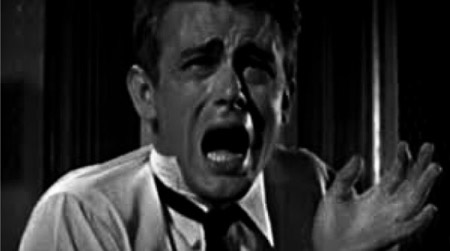
REBEL WITHOUT A CAUSE
“YOU’RE TEARING ME APART!” JIMMY SCREAMS, IGNITING THE ANGST OF TEENAGERS EVERYWHERE

Long before he met Jimmy, director Nicholas Ray had filmed They Live by Night (1949), co-starring Farley Granger and Cathy O’Donnell, a film noir story of teenage lovers fleeing from the law.
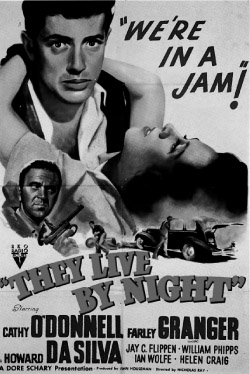
Rebel’s 1949 predecessor–noir, with a focus on juvenile delinquents, with direction by Nick Ray and starring bobbysox heartthrob Farley Granger.
Since then, he had wanted to create another “youth-in-angst” saga. Originally entitled The Blind Run, it was later renamed Rebel Without a Cause.
In the late 1940s, he’d screen tested Marlon Brando for the role, but never got a green light to film a script inspired by a case study researched and written by Dr. Robert Lindner, Rebel Without A Cause: The Hypnoanalysis Of A Criminal Psychopath. It had been researched during his stint as a staff psychiatrist at the Federal Penitentiary in Lewisberg, Pennsylvania. Warners had acquired the film rights to Lindner’s book back in 1943, but the property just languished on the shelf until it was reactivated in 1954, an era when juvenile delinquency was making headlines across the country.
Ray had just filmed what became one of the most notorious westerns of all time, Johnny Guitar (1954), co-starring Joan Crawford and Mercedes McCambridge. “I fucked Crawford and got to suck off Scott Brady, who is very well hung,” Ray later told Jimmy Dean shortly after they met. “I got to see Sterling Hayden, a Viking god, in the nude, and what a whopper, but he made it clear to me he was off limits.”
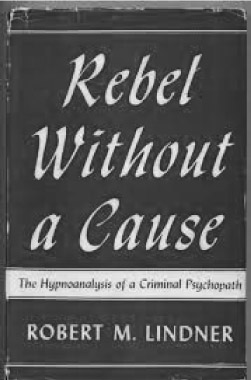
Nicholas Ray’s film project had impressively scholastic origins: written by the resident psychiatriast at a Federal penitentiary, it was subtitled, The Hypnoanalysis of a Criminal Psychpath.
When James Dean was cast into the male lead, his enemies and detractors made note of the original title.
Ray went through two distinguished writers, Leon Uris and Irving Shulman, rejecting each of their scripts.
Ray finally hired Stewart Stern, the cousin of Jimmy’s lover, Arthur Loew, Jr. He’d written the script for Pier Angeli’s debut film, Teresa (1951). In Stern’s version of the script, seventeen-year-old Jim Stark is the new kid on the block, arriving at Dawson High, where he is immediately menaced by a tough gang.
“We get going with a bang,” Ray said. “Stark gets into trouble with the cops, the girl next door snubs him, and a young homosexual develops a crush on him.”
It was a screening in New York of East of Eden that had convinced Ray that Jimmy would make the ideal Jim Stark. He immediately got in touch with Jimmy’s New York agent, Jane Deacy, and a meeting was scheduled.
The two men bonded almost from the first. Although Jimmy had already turned twenty-four, Ray thought he looked young enough to pass for a teenager.
“Jim Stark and Jimmy shared one thing in common,” Ray said. “Both of them wanted to belong, yet feared belonging. Dean understood the character, and Stark’s conflict of violent eagerness and mistrust, the intensity of his desires, his fear, all of which could make him at times arrogant and egocentric. I felt Dean could capture the character behind all this and depict Stark’s desperate vulnerability.”
Ray spent two weeks in New York with Jimmy, concluding that he encapsulated many of Jim Stark’s characteristics, as laid out in the script. “He was both the boy and the man, the gay and the straight, the tender and the violent.”
Ray told Elia Kazan, “I lived for a while with Jimmy in that little apartment of his, cluttered with books and other junk, including a matador’s cape on the wall. We went to a lot of movies. We got drunk a lot. Jimmy let me fuck him…a lot. He was better than my former wife, that whore, Gloria Grahame.”
“Actually, I needed Dean to help me flesh in Stark’s character and bring him to life on the screen. The script had not been fully developed. I wanted Dean to probe his own experiences in life and apply them when needed.”
As Ray told Kazan, who had helmed Jimmy in East of Eden, “You know I walk on both sides of the sidewalk. I not only screwed Jimmy in New York, and I plan to take director’s privilege and keep plugging him as long as we’re making Rebel. I’m looking forward to it.”
“I’d rather fuck Marilyn Monroe, which I do,” Kazan said.
After returning to Los Angeles, Jimmy hit some of the rougher streets, hanging out with alienated young men and often with their “gang molls,” as he called their girlfriends. “They wore leather jackets and roamed the streets at night, looking for a faggot to beat up. Not all of them were poor. Some were from rich families. Boy, those guys scared me. One night, I got gang raped by three guys. But I’m not going to go into that.” [He made this revelation to Ray, who had already flown back to Hollywood.]
Jimmy signed on to the film shortly before Christmas of 1954. At the time, he had serious reservations about it, interpreting it as a Grade B movie typical of the type being cranked out by producer Roger Corman.
Originally, Stern had told Jimmy that he envisioned Rebel “as a modern version of Peter Pan, three troubled kids inventing a world of their own. I want to say something about the nature of loneliness.”
“I set for myself a big goal,” Stern said. “Within a period of only twenty-four hours, I wanted to tell the story of a young generation coming into maturity.”
Stern later said, “It was obvious to me that Jimmy did not want to play the role I wrote. He wanted to play himself.”
Before shooting began, Ray asked Jimmy about his draft status. “I was rejected for bad eyes, flat feet, and butt plugging.”
For his work on the film, Jimmy would receive only $12,500.
[That compared with 20th Century Fox giving Marilyn Monroe $15,000 for her co-starring role in Gentlemen Prefer Blondes (1953).
[The James Dean Foundation takes in $6 million annually, including licensing agreements for such products as jogging suits, T-shirts, pillowcases, and sunglasses. In Japan, a customer can buy a life-size mannequin of Dean to take to bed for whatever pleasure one desires.]
***
Author Gore Vidal was living at the Château Marmont with his longtime companion, Howard Austen. His friend, Paul Newman, had turned him onto the place. Grace Kelly occupied one of its bungalows, as did Nicholas Ray. One Sunday, Vidal met Ray by the pool, where he introduced himself, thinking that perhaps he might buy one of the film scripts he was writing at the time.
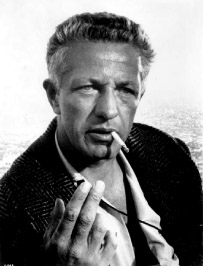
Nicholas Ray in 1961. Gore Vidal described him as “a silver haired, chain-smoking auteur cursed with a romantic nature and a taste for vice.”
Within thirty minutes, Vidal and Ray argued, Vidal maintaining that the scriptwriter was more vital to the film than its director. Ray responded with, “If it’s all in the script, why film it?”
Despite their disagreement, Ray invited Vidal to a party that he was hosting later in his bungalow. He told Vidal that he was casting a film called The Blind Run about juvenile delinquents and starring James Dean.
“I’ve seen Dean before,” Vidal said. “At the Actors Studio. He’s always hanging around sucking up to Tennessee Williams, hoping he’ll write another great part like he did for Brando.”
Vidal attended the party with every intention of “putting the make on Dean.” But it didn’t work out that way. “I found him arrogant and insulting to me. What a prick he was. We hated each other on sight.”
Vidal later described his negative impression of Dean to Ray: “The first thing he said to me was, ‘I never heard of you.’ He knew damn well who I was. I should have told him, ‘I never heard of you, either, punk.’”
“Since you and Dean didn’t hit it off, I’ll introduce you to Dennis Hopper,” Ray said. “He’s just getting started as an actor. And he’s available—that is, if you’re not a size queen.”
After Jimmy’s casting as the male lead was finalized, Ray set about hiring the rest of the ensemble. The film’s other most important role was that of Judy.
As a juvenile delinquent, she comes from a cold home and perhaps is in love with her father, who can’t stand for her to kiss him. Her character yearns for a utopian family that includes Jim and herself as central figures.
Jimmy’s friend, Lew Bracker, left the impression in a memoir that starlet Lori Nelson had not made a favorable impression on Jimmy when they dated briefly. Actually, Jimmy may have been more impressed with her than Bracker thought. He recommended that Ray consider Lori for the role of Judy. His recommendation was backed up by an onslaught of letters from the Lori Nelson Fan Club, pleading with Ray to cast their favorite star as Judy.
For a very brief period, Ray considered Margaret O’Brien, the former child actress of the 1940s, for the role. As a child, she had enthralled audiences of the World War II era, eventually replacing the fast- maturing (and increasingly syrupy) Shirley Temple as America’s favorite pre-adolescent.
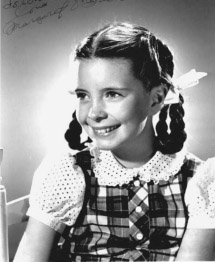
Margaret O’Brien as Tootie...adorable, but not right for the portrayal of a teenage trollop.
After MGM let her go after she turned twelve, she complained to the press, “The public can’t accept me with a bosom.”
Jimmy had seen her in only one film. When she was seven, she had played Judy Garland’s sister, Tootie, in Meet Me in St. Louis (1944).
When Ray auditioned Margaret, he asked her what she thought of her parents. “I love them,” she answered. That was not the response he wanted. “Judy is alienated from her parents,” Ray said.
Jimmy told him, “I can’t emote with Little Tootie. Instead of Margaret, why not Shirley Temple?” he asked sarcastically. “Seriously, perhaps you’ll consider Carroll Baker.”
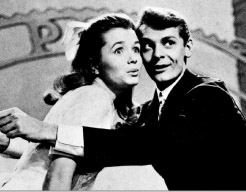
Unconvincing as Juvenile Delinquents: Debbie Reynolds with Carleton Carpenter singing and dancing “Aba-Dabba Honeymoon”
Margaret O’Brien was out the door.
Jimmy pursued Baker, whom he knew from the Actors Studio. When she was contemplating a role in Giant, he approached her. “I’m going to do another film before Giant. The script is crap, but the characters are good. I think you’d be perfect in the female lead of Judy. The director, Nick Ray, is a good guy. I’ll take you to him, I bet his tongue is hanging out at the prospect of getting you. I’ve already pitched you for the lead.”
Baker, however, was also rejected by Ray.
Ray told Jimmy that MGM “is trying to push Debbie Reynolds onto me. I guess they don’t have anything for her to do. If it’s a musical, she’d have been perfect.”
“I’ve met her,” Jimmy said. “She’s the least likely juvenile delinquent in Hollywood. Maybe you could recycle ‘Abba-Daba Honeymoon.’”
[Relentlessly cheerful, and written and first recorded in 1914, “Aba-Daba Honeymoon” became a nationwide hit in 1950 when it was reprised in Two Weeks with Love (1950) as a song-and-soft shoe dance by Debbie Reynolds, Carleton Carpenter, and a banjo-strumming ensemble of Edwardian-era singers and dancers.]
The next candidate for the role of Judy was Jayne Mansfield, whose widely publicized superstructure famously measured 40”-24”-36”.
Jimmy said, “As Judy, she would be ‘busting’ out all over.”
The studio was pushing Jayne onto Ray, who defined the idea of casting her as “the most outlandish suggestion of the decade.”
Actually, Mansfield as Judy was not as outlandish as, in retrospect, it appears. Rebel had originally been conceived as a cheap and fast-produced black-and-white juvenile delinquent film of the genre so popular in the 1950s. Some of those featured Jayne’s major rival at the time, Mamie Van Doren, whose quickie genre flicks later included Untamed Youth (1957)
As the script for Rebel had originally been conceived, the film would have opened with sixteen-year-old Judy being arrested for solicitation. That episode was later “tamed,” rewritten to depict being disciplined at the police station for breaking curfew.
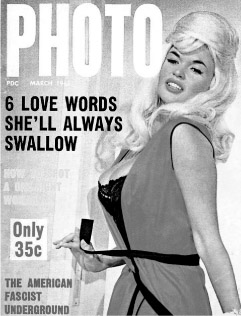
Jayne Mansfield as a cover girl in March, 1965, and...
Actually, Ray was secretly dating Mansfield at the time, and over pillow talk, she was urging him to cast her as Judy. She agreed to a screen test, but the director later confessed, “I didn’t put any film in the camera. I knew at the time I was never going to use her.”
Ray was also engaged at the time in “carnal adventures” with Shelley Winters, who recalled that his bungalow at the studio was “surrounded by night-blooming jasmine.” Also seen coming and going from that bungalow were two other blondes, Marilyn Monroe and Judy Holliday.
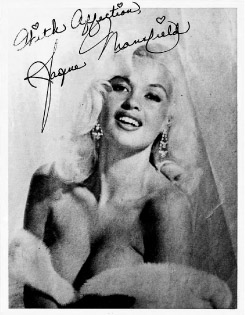
Jayne Mansfield as Queen Deianira in Amori di Erole (The Loves of Hercules), released in 1960. Four months pregnant at the time of this photo, she insisted that Hercules be played by her husband, muscleman Mickey Hargitay.
Outside Italy, where it was filmed, it was released as Hercules vs. the Hydra as a late-night TV teleplay.
When Jimmy learned that Ray was dropping Jayne, both as a girlfriend and as a candidate for the role of Judy, he said, “Wait one night before telling her. Give me her number. I want to call her and tell her that I’d like to test the chemistry between Jim Stark and Judy.”
“Okay, buster,” Ray responded. “But you’ll owe me one. You’ll get Jayne’s ass, and I’ll get yours.”
Dubbed “The Working Man’s Marilyn Monroe,” Jayne seemed only too eager to welcome Jimmy into her home. She’d cleared the house of family members and servants so that she could entertain him in private.
He later reported to Ray, “As you know from banging Jayne, she’s more of a cinematic sight gag than an actress, but she sure is bosomy and breathy. She cooed and aaahed her way through the night, especially when I plugged her. She greeted me at the door in an ivory-colored see-through négligée. She didn’t walk toward me, she sashayed.”
“I couldn’t wait to sink my teeth into those pink nipples of hers. She served me dinner. All her décor is pink and heart-shaped. Cupids everywhere. She even dyes the mashed potatoes pink. Naturally, the drink was pink champagne.”
“I detest the color pink,” she told him. “But it’s important for my image. Men want women pink, helpless, and to do a lot of deep breathing. When I was first told about how sex worked, I laughed and then I cried. I just couldn’t see the point of it. Fortunately, I’ve changed.”
“After our romp in her pink bed with its pink sheets, she told me that she just knew that she could play ‘that trollop Judy,’ even though I’m a good girl.”
“If you get the part, we’ll have to change the title,” he said. “Make it Rebel With a Cause.”
“And what might that be?” she asked.
“To bang Suzi every night.” [She had already told him that she’d nicknamed her vagina Suzi.]
After that encounter, Jimmy never saw Mansfield again and, needless to say, she didn’t get the role of Judy.
—Natalie Wood
Ray might have gone for Carroll Baker had not a sixteen-year-old brunette, a ferociously competitive former child actress, entered the fray.
Her name was Natalie Wood.
She had worked with Jimmy before in the teleplay, I’m a Fool, based on a plot by Sherwood Anderson, and more fully described in Chapter Eight of this biography. I’m a Fool was eventually broadcast in November of 1954 through television’s General Electric Theater, hosted by Ronald Reagan.
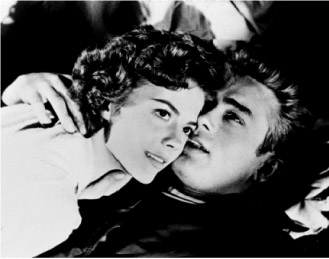
Natalie Wood is seen emoting with James Dean in Rebel Without a Cause. When she read the script, she said, “I am Judy. The story mirrors themes from my own rebellious teen years.”
After her first viewing of East of Eden, Natalie exited from Hollywood’s Egyptian Theater exclaiming to her girlfriend, “I’m going to marry that Jimmy Dean!”
“I felt an instant link to Judy,” Natalie said. “I just had to take the role to express something inside of me. Up until Rebel, I had been a child actress, or else playing an ingénue. Judy was real, a gutsy character. The prospect of bringing her to the screen with Jimmy thrilled me.”
As she admitted, she stalked Ray, trying to get the role. “Nick still saw me as a child actress in pigtails,” she lamented. “I knew I had to convince him I was grown up. Actually, I was only sixteen, but I had the desires of a woman.”
“Then one night, I was involved in a car accident with Dennis Hopper, who would also get cast in Rebel. Ever since Nick Adams, who was also cast in the picture, took my virginity, I’d been carrying on with both of them. Dennis and I had this car accident, and I was rushed to the hospital, injured.”
“I ordered the nurse to call Ray at once and get his ass over here,” she said. “I wanted him to see me in my condition. He looked me over. I was a wild juvenile delinquent out speeding in a car with my lover. ‘Now do I get the part?’ I demanded of him. He thought about it a minute, and then said, ‘You are our Judy.’”
“Ray not only gave me the part,” she told Jimmy. “He’s also fucking me. Is there a man who doesn’t desire a sixteen-year-old girl?”
She revealed, “Nick took me to a tiny candlelit restaurant where the tablecloths were pink. We drank pink champagne. Jayne Mansfield had nothing on him when it comes to pink. Incidentally, pink is my favorite color.”
“He then took me back to his suite at the Château Marmont, where he seduced me. He told me, ‘I want to make love to you.’ That was so romantic. Most of you young guys tell a gal, ‘I want to screw you. How about it?’”
“Nick might be an old man, but some guys are still sexy after forty,” she said. “And he sure knows how to deliver the goods. “He’s a thirty-minute man in the saddle. Poor Dennis seems to shoot off just as he’s putting it in.”
Later, she would tell her friends that she and Jimmy shared some of the same men: Arthur Loew, Jr., Nick Adams, Dennis Hopper, Steve McQueen, and Lance Reventlow. She included Tab Hunter in that list as well, although in his case, despite rumors, it’s unclear whether he was actually involved with Jimmy.
Jack Simmons had come to Hollywood to become a movie star, or at least a screen actor. John Gilmore remembered his hook nose. “Everybody called him ‘The Hawk.’ He had a reputation as one of the most notorious faggots of Hollywood.”
The first time Gilmore met Simmons, he was dancing with Rock Hudson at a gay bar in Santa Monica, the Tropical Village, and wearing a tight-fitting pink bikini. Gilmore wrote that Simmons was “a reject, a pitiful fringe-nut in Hollywood’s substratum, who captured Jimmy’s interest with his unwavering, doglike devotion.” Jack would later claim that Jimmy was the only love of his life.”
Author Donald Spoto wrote: “For years, the Dean-Simmons friendship was the subject of considerable pornographic imagination. Both men died without uttering a word about the specifics of their relationship, and, as the old maxim runs, no one held the lamp. Most people in the social circle saw the devotion as one-sided. It was a case of the adoring Jack, the acolyte to a diffident Jimmy, who made him a kind of hip valet.”
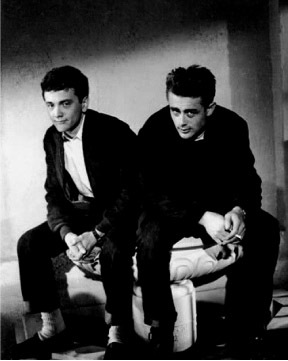
Jack Simmons (left), told friends that he was going to pursue James Dean, get him, and then spend the rest of his life doing whatever he wanted him to do.
Based on events that later unfolded, only the first two parts of Jack’s plan ever came to be.
Faye Nuell Mayo, Natalie’s stand-in on Rebel, claimed, “Simmons adored Jimmy, but how seriously Jimmy took him was really unclear to everybody.”
Simmons was the best friend of Maila Nurmi (Vampira), and it had been through her that he had met Jimmy.
Biographer Paul Alexander wrote: “When Jimmy returned to Hollywood, he and Jack Simmons became romantically involved. More than likely, it was Jack who made himself available to Jimmy, for he had seen pictures of Jimmy in the newspapers and had gone to see East of Eden.”
Jack told friends that he was going to pursue Jimmy, get him, then spend the rest of his life doing whatever Jimmy wanted him to do. Based on events that later unfolded, only the first two parts of Jack’s plan came true.
Jimmy told William Bast that when they first met, he considered Simmons “a pest. He wants to have sex with me, but I keep turning him down. I’m not remotely attracted to the kid sexually. He keeps telling everybody that sooner or later, he’s going to kiss me.”
Simmons did not take Jimmy’s rejection as his final word. He remained undaunted in his pursuit.
Vampira learned and later talked about the intimate details of their relationship: “When Jimmy found out that Jack imposed no limits on what he would do sexually, Jimmy reappraised him. They had a lot of sex. Jack told me about it. But it wasn’t the usual kind of sex.”
“With Jack, Jimmy began to live out his darker fantasies. He was very abusive to Jack and put him through all sorts of hideous, disgusting scenes, things no human should do to another. And Jack took it.”
“I don’t want to go into the graphics, but surely, you can use your imagination. Bondage was the more vanilla stuff Jack went through.”
Jimmy used his influence to get Simmons cast in a teleplay, The Dark, Dark Hour, which also starred Ronald Reagan.
Jimmy got Ray to agree to a screen test that would include Simmons and himself as a means of evaluating his suitability as Plato. It was a disaster.
The venue was the stage set for A Streetcar Named Desire, which had not yet been dismantled. The stairway to the Kowalski apartment in New Orleans was still there. Jimmy couldn’t resist running up those steps, bellowing like Brando did in both the stage and movie versions, “STELLA-A-A-A-A-A!”
“I couldn’t believe what happened next,” Ray said. “Suddenly, Simmons followed Jimmy up the steps, and the two men disappeared behind a screen. We heard them giggling, followed by two golden streams of urine raining down from one of the flat’s windows. It turned out these jokers were having a pissing contest to see which stream could reach the greatest height. Jimmy said he won the contest, but how would I know?”
He later told Ray, “Jack was nervous, and I figured pissing might relax him before the test.”
“The boy just couldn’t act,” Ray said. “But he was a real pisser.”
Ray rejected Simmons for the role of Plato. According to Stewart Stern, “In my script, I wanted to present Jim Stark and Plato in gay overtones. But Simmons was a bit much. It would have made Plato’s relationship with Jim Stark too obvious, just too much.”
After Simmons was rejected as Plato, Jimmy managed to get him cast as Moose, one of the gang members.
During the filming of Rebel, Simmons lived with Jimmy at his apartment on Sunset Plaza Drive.
Simmons was absolutely devoted to and committed to Jimmy, but he finally dropped him altogether.
Columnist Sidney Skolsky wrote: “Wherever Jimmy goes, Simmons was sure to follow. If Jimmy wants coffee, he gets it. A sandwich, Simmons gets it. He also runs interference for Jimmy, keeping people away if Jimmy doesn’t want to see them.”
Decades later, Simmons would break down and sob at the mention of Jimmy’s name. He claimed that he had not only lost his “one true love,” but his soul as well.
For weeks, Sal Mineo, in avid pursuit of the role of Plato, had pursued Ray.
Mineo was the veteran of two Broadway shows, including The King and I (during the course of which Yul Brynner had molested him backstage) and Tennessee Williams’ The Rose Tattoo. Despite his status as a fifteen-year-old, he was nonetheless fully immersed in homosexuality. “I matured early in the Bronx, especially one part of me.”

Three views of Sal Mineo, America’s first (onscreen) gay teenager.
At the time, he was already a film industry veteran, having appeared in two movies, Six Bridges to Cross, and The Private War of Major Benson, both released in 1955.
Ray kept rejecting him as Plato, claiming, “I don’t see any possible chemistry between you and Dean.”
But finally, he relented, inviting both Jimmy and Mineo to his lodgings at the Château Marmont.
Mineo arrived wearing pegged pants, a skinny tie, and a jacket. Jimmy showed up in jeans and a Tshirt. “They were from different planets,” Ray said.
Mineo later revealed what happened that late Sunday afternoon.
“At first, Jimmy and I were awkward, and I gave a bad first reading of the script. Perhaps Ray was right: We had no sexual chemistry. But I was determined to play Plato, and begged for a chance to do it over. Ray tried to get us to relax with each other. Instead of reading the script, we were told to improvise.”
“Suddenly, Jimmy and I were talking to each other, and he was fascinated to learn I’d been a street kid from the Bronx. We relaxed—and how! He even started to wrestle me, which ended up in a long, passionate kiss. We stripped down to our underwear and continued to wrestle some more until both of us got erections. Off came our panties.”
“Right in front of Ray, I came on to Jimmy like gangbusters. Ray was all eyes. Jimmy and I really went at it. When I looked over at our director, he’d whipped it out and was jerking off. I got the role of Plato, and I later got Ray. But by then, I was already in love with Jimmy.”
Something happened during the making of Rebel, Mineo said. “It was as close as you could get to a spiritual experience. Jimmy was the focus of all of it. Everything that happened was a result of his presence.”
During the first week of his involvement with Rebel, Jimmy told Mineo that he couldn’t sleep and that he was overcome with a nervous anxiety. He went to three sessions with a psychiatrist. “This headshrinker told me to love my father. What a stupid assignment! I could have told him that fifteen years ago. The fucker should have tried to love my father himself.”
“Whatever’s inside me makes me what I am. Cut me open and take it out, and let in the light, and it might kill my acting talent. Tennessee Williams calls it ‘creative malady.’ Sometimes, it’s the wackos who create the greatest art. Make them normal, and they may lose that neurosis that drives them to create in the first place.”
Natalie’s double on Rebel, Faye Nuell Mayo, also became aware of Jimmy’s anxiety, and she thought she knew what might help to relieve his tension. She invited him to attend a class where Kenpō karate was taught.
He attended only one class and didn’t like it. He told her, “Instead of a karate chop, I prefer to stick to my own kind of fighting. A finger with a sharp nail in the eyeball, and a castrating kick in the balls.”
After players for Rebel’s three leading characters had been cast, Ray set about hiring actors for the secondary roles, including Jim Backus and Marsha Hunt.
[Marsha Hunt, hailing from Chicago, was known as “Hollywood’s most unfortunate also-rans.” Attractive, and with alluring eyes, she spend most of her career under contract for MGM, making B-list pictures, or as a supporting player in such movies as Pride and Prejudice (1940) playing one of Greer Garson’s sisters.
Regrettably, during the early 1950s, she came under fire from Senator Joseph McCarthy, who claimed she was a communist. When Ray cast her in 1955, she had not worked in three years because of her inclusion on the Red Channels list.
When she arrived on the set of Rebel, she announced to Jimmy, “Here’s what’s left of Marsha Hunt after all those witch hunters in Washington finished with me.”
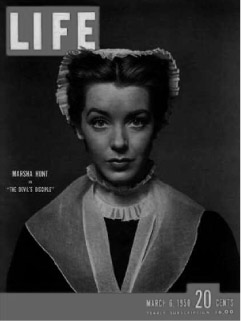
A McCarthy-Era Tragedy: One of the candidates favored by Ray for the role of Jimmy’s mother was Marsha Hunt, whose involvement on Broadway in The Devil’s Disciple earned her a place on the cover of the March 6, 1950 of LIFE magazine.
Despite her competency in more than 50 film roles in the late 30s and 40s, her blacklisting by the film industry for her political views cost her the role of James Dean’s mother in Rebel Without a Cause, and virtually every other film role for which she applied throughout the rest of her working years.
Ray, also a champion of left-wing positions, wanted her for the role of Jim Stark’s henpecking mother until a phone call came in from Jack Warner, asking him to get rid of her and to cast Ann Doran instead.]
***
Doran, once marketed as “The Yellow Rose of Amarillo, Texas,” was cast as Jimmy’s domineering mother. As a hard-core shrew and a major league emotional blackmailer, her character reminds Jim Stark that, “I almost died giving birth to you.”
[In time, Doran, a genuine Hollywood workhorse, would appear in some five-hundred motion pictures.]
In an unlikely friendship, Jimmy bonded with her, although she claimed that he almost killed her after they’d first met. He had invited her for a ride on his motorcycle.
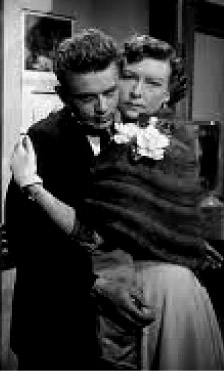
At the police station, Mrs. Stark, as portrayed by Ann Doran, grips her son in a suffocating embrace.
Jim Backus, cast as Jim Stark’s father, warned her, “Jimmy Dean is opinionated, and he’ll tell you how to act.”
“Just let him try it!” she responded.
Backus was right. After his first rehearsal with Doran, Jimmy attempted to tell her how to play it.
“Listen, junior,” she said, icily. “I’ve been around a long time, and you’re new. Don’t tell me how to do it. Let me make my own mistakes.”
Despite their early confrontation, the two actors bonded, and soon he was referring to her as “Mom.”
Prior to his casting as Jimmy’s henpecked screen father, Jim Backus, beginning in 1949, had been known mainly as the voice of the cartoon character, “Mr. Magoo.” Later, he was indelibly association with his characterization of a wealthy, out-of-his-depth eccentric, Thurston Howell III, on the widely syndicated TV sitcom, Gilligan’s Island (1964-1967)
He was astonished to see Jimmy directing the picture. “Never in the history of motion pictures had an inexperienced 24-year-old become, in essence, a co-director, especially with one as established as Nicholas Ray. He gave Jimmy full reign.”
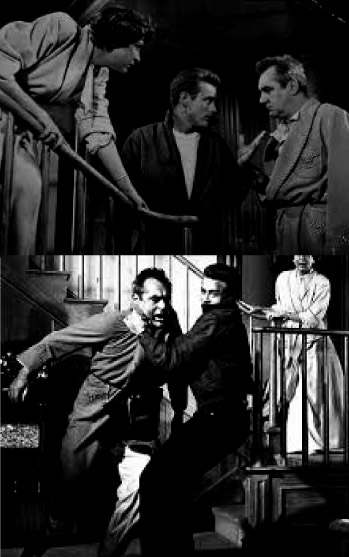
Cast against type, character actor Jim Backus appeared with James Dean in one of the most iconic scenes of Rebel Without a Cause.
As the cameras rolled, Jimmy shocked Backus by accelerating their confrontation, unannounced and unrehearsed, into a fistfight, as Ann Doran (Jimmy’s film mother), looks on.
Judy’s parents were to be played by William Hopper and Rochelle Hudson. Hopper had appeared in more than 80 feature films during the 1930s and 1940s, although he’d obtained his greatest fame as Paul Drake to Raymond Burr’s Perry Mason in a TV series (1957-1966). Although married, Hopper pursed a closeted homosexual lifestyle. Stanley Haggart, Jimmy’s friend, had known Hopper back in the 1930s.
“Bill appeared in more than ten films with Ronald Reagan,” Haggart said. “He had a big crush on Reagan, but apparently, he never scored, even though they shared a bedroom together on location. He got to see Reagan in the nude—and that’s about it.”
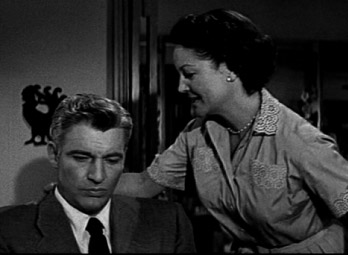
Blinkered, naive, uncomprehending 1950s-era domestic hell: William Hopper and Rochelle Hudson, portraying Judy’s parents.
“Alas,” Hopper said. “Ronnie was saving it for Lana Turner or Susan Hayward.”
In Rebel, Rochelle Hudson was hired to portray Natalie Wood’s mother. A star in the 1930s, she’d begun making pictures when she was sixteen as an attractive ingénue. She’d already appeared in such films as She Done Him Wrong (1933) with Mae West and Cary Grant, and she had starred as Claudette Colbert’s daughter in Imitation of Life (1934). Jimmy knew nothing of her movie career, but wanted to hear about her espionage work for Naval intelligence when she was stationed in Central America during World War II.
For Hudson, a woman who’d starred in major movies, her role in Rebel wasn’t much. One reviewer noted, “She is nothing but a cardboard cutout of a 1950s sitcom mom.”
As juvenile delinquents, Ray rounded up a cast that included Corey Allen, Beverly Long, Frank Mazzola, Steffi Sidney, Jack Simmons, and Dennis Hopper.
For a while, Steffi Sidney held out the hope that she might be cast as Judy. However, Ray decided instead to give her the lesser role of Millie, one of the “gang molls.” Steffi was the daughter of the famous Hollywood columnist Sidney Skolsky, who had written extensively about Jimmy. His “office” was Schwab’s Drugstore, where Jimmy often hung out.
According to Steffi, “My character always carried a hairbrush with her, and I was a very insecure girl who desperately wanted to belong to the gang.”
Some of the other cast members resented her, charging nepotism, claiming that Steffi got the part only because of her influential father. The same charge was leveled against William Hopper, son of Hedda Hopper, who was cast as Natalie’s angry father.
Steffi was disappointed with Rebel’s final cut. “My scenes were eliminated. I was left with one line and a sneeze.”
She said that the first time she saw Jimmy, which was during a wardrobe test, “He came up to me, and he just swaggered, and then he hit me real hard. I thought, ‘Why in hell did he do that to me?’ The next time he wandered over, I said, ‘What, you’re not going to hit me again?’ He said, ‘No, no, my name is Jimmy Dean.’”
Of all the gang members, only Dennis Hopper was being groomed for stardom at Warners. “I tried to get to know Jimmy. I started by saying ‘hello.’ No answer. He wouldn’t talk to people on the set. He would go into his dressing room. He would be into himself, into his thing. He’d lock himself away.”
“Finally, about halfway through filming, during a break in the nighttime filming of ‘the chickie run’ scene, I grabbed him and threw him into the car. I said, ‘Look, I want to be an actor, too, and I wanna know what you’re doing, what your secret is.”
Dennis wrote those words in James Dean: The First American Teenager. After that night, the ice was broken, and they became intimate friends.
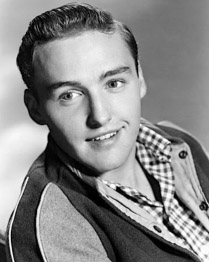
Peter Winkler, who wrote a biography of Dennis Hopper (depicted above), said, “It is difficult to overstate the importance of James Dean’s influence and the impact it had on Hopper’s life. He once spoke of Dean as if recalling the love of his life.”
Cast as “Goon,” Dennis was four years younger than Jimmy and looked even younger. Like Jimmy, he had grown up in the Middle West, in his case, Kansas. He told Jimmy, “When I was a kid, I used to get off sniffing gasoline from my grandfather’s truck.”
“There will never be another man like Dean,” Dennis said after his friend died. “In a strange way, I had a closer friendship with him than most men have with each other. It wasn’t the kind of friendship where you say, ‘Let’s go out and tear up the town.’ Sometimes, we’d just have a quiet dinner together and share our darkest secrets. Also, Jimmy and I were into peyote and grass before anybody else caught on.”
“I was with him almost every day for the last eight months of his life,” Hopper claimed. “I was haunted by his death, which had been the greatest emotional shock of my life. When he died, I felt cheated. I had my dreams tied up with him. His death blew my mind.”
When pressed about whether his relationship with Jimmy turned sexual, he said, “What in the fuck do you think? How much do I have to spell it out? Do you want a blow-by-blow description?”
Movie historian David Thomson wrote, “Dennis Hopper was an ardent young man fatally unlucky to cross the path of James Dean—in Rebel Without a Cause and Giant. He believed he was the heir to something. He knew he wanted to act, and he believed that rebellion was some proof of his artistic integrity. Much of Hollywood found Hopper a pain in the ass, strident, staring, and monotonous.”
***
Corey Allen was cast as the gang’s leader, “Buzz,” who tangles with Jimmy in an ego-driven conflict that ends in a knife fight.
He claimed, “I was twenty, inexperienced, and I had a very high kind of voice. I felt unmasculine. I was awed to be working with Jimmy after seeing him in East of Eden. When I met him, we got off on a bad start. I came up to him where he was sitting, surrounded by a bunch of kids fawning over him. I told him I was going to be his adversary in Rebel. Without looking up, he said, ‘Yeah, hi.’ And then he turned back to chatting with those adoring kids.”
Three years younger than Jimmy, Allen bore an amazing resemblance to a young Marlon Brando. “On the second day, when Jimmy talked to me and looked at me, I felt that instead of indifference, he was really turned on by me. He felt I looked like either Brando’s son or else his younger brother. He brought that up time and time again.”
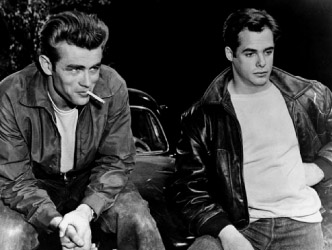
James Dean with Corey Allen: “Gay directors were known for ‘auditioning’ young actors on the casting couch. But in the case of Jimmy, he auditioned me.”
Ray warned Allen not to get carried away and to try to imitate Jimmy’s style.
To that, Allen responded, “Jimmy was like a kind of black hole, with magnetism so great that nothing can go in the other direction.”
Ray recruited a real, “from the streets” gang leader, Frank Mazzola, to play “Crunch,” a member of the gang in Rebel. As a child, he had worked on the Bogie film, Casablanca. At Hollywood High, he’d led the Athenians, the most infamous gang in the city.
“Our major activity was strolling the streets at night, trying to pick a fight with some punk,” he said. “We were real tough guys, football players, boxers. One time, I punched this guy and threw him out of a second-story window. He survived, with a few broken bones.”
“I played the right-hand man to Buzz, the leader of the pack, but I should have been the Big Cheese.”
Mazzola got to know Jimmy and even took him shopping to show him how a contemporary teenager dressed. “Jimmy was allowed to attend secret meetings of the Athenians. Sometimes he’d spar with me, but mostly we just hung out. He was a good basketball player.”
Beverly Long had been in the Pepsi Cola commercial that’s acknowledged today as Jimmy’s first appearance on TV, and was said to have dated him for a while.
Long was cast as Helen, a tough, pony-tailed blonde bimbo.
“You never knew what Jimmy’s attitude would be,” she said. “In the morning, he might speak to you, then again, he might not. He could look right through you like you didn’t exist.”
“I was easy prey for his off-color jokes. One time, in one scene, while he was repairing a slit tire that Buzz had slashed, Dean handed me the tire iron. ‘Ever felt a thing so hard in your life?’ he asked me. He could twist and turn anything into an off-color joke.”
Dennis said, “Jimmy captured the moment of youth, that moment where we’re desperately trying to find ourselves.”
Mineo went a step farther: “Jimmy started the youth movement.”
—Johnny Weissmuller
Two weeks before actual shooting began on Rebel, Jimmy mysteriously disappeared. There were rumors that he’d been kidnapped by a gang of gay bikers, and that they were repeatedly sodomizing him at some remote desert outpost.
Jack Warner phoned Jimmy’s West Coast agent, Dick Clayton, threatening him. “If that bastard kid doesn’t show up in the next forty-eight hours, I’m firing him from the picture and replacing him with Robert Wagner, if he’s available. If he’s not, then maybe John Kerr.”
Thinking he might not return, Ray considered recasting Dennis Hopper as Jim Stark.
“It would have been my first big break,” Dennis reflected, years later. “Alas, it was not meant to be. Thank god that Easy Rider later came along.”
Jimmy’s mystery trip out of Hollywood may have had something to do with a casual chat he’d had with Stewart Stern, who was still revising the script. He wanted to signal to the world that Plato was gay, but not in any obvious way that would incite censors to cut it.
He came up with the idea of Plato opening his locker at school. Inside their own lockers, the other boys often attached publicity photographs of their favorite pinup queens.
“I wanted Plato to post a really handsome picture of his favorite hunk of beef. That will show viewers what turns him on.”
Jimmy said that during his teenage years in Indiana, he had decorated the walls of his bedroom with pictures of screen Tarzan, Johnny Weissmuller.
“Why don’t you call him?” Stern asked.
“Maybe he wouldn’t even talk to me,” Jimmy replied.
“Wise up, kid,” Stern said. “You’re now a god damn movie star. One of the privileges of being a hot-shot star is that you can get to meet almost anyone you want. As I said, ring him up. I bet he’d meet with you any time you wanted.”
“Maybe I’ll just do that,” Jimmy said. “See if the real thing lives up to my schoolboy crush.”
Jimmy’s friend, Stanley Haggart, who had sometimes granted him access to one of his apartments in New York, and also to his guest cottage in Laurel Canyon for his sexual trysts, knew what Jimmy was up to.
According to Haggart, “Just out of the blue, Jimmy, in New York, phoned and asked if he could come by with a friend. I told him that would be fine. When he showed up with this mysterious friend, I was shocked. It was the film industry’s most famous Tarzan, Johnny Weissmuller. If Jimmy was known for anything, it was for his ‘odd couple’ matings.”
“He later explained that as a kid, he had long fantasized about Tarzan in his loincloth.”
“I understand that,” Haggart said. “I collected pictures of John Gilbert.” He welcomed both of them, and even fed them a late night supper with champagne.
Jimmy claimed that he’d met his screen idol at his favorite restaurant, the Villa Capri. The owner had given the Austria-born former athlete permission to let out his ear-splitting jungle yell any time he came in for dinner. Weissmuller would thump his chest and bellow that maniacal yell.
“I tried to imitate that yell as a kid,” Jimmy said. “But it never came out right.”
As it turned out, Weissmuller was an amusing guest, not at all as inarticulate as Tarzan.
“Jimmy and I discovered we have something in common,” he said. “We’ve both fucked Joan Crawford and Tallulah Bankhead. Tallulah once told me, ‘Dahling! You are the kind of man a woman like me must shanghai and keep under lock and key until both of us are entirely spent. Prepare for a leave of at least ten days.’”
Weissmuller went on to relay other amusing stories based on his early days in Hollywood, some of them were spent traveling on promotional tours for the Tarzan series.
“In Texas, during World War II, I was at a bond rally. I was auctioned off, presumably to deliver the Tarzan yell in private. The highest bidder was willing to pay $50,000. Some sources say only $5,000. But it was $50,000 big ones. A rich Texas oilman was the highest bidder.”
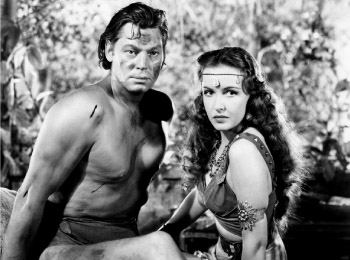
Weissmuller with Frances Gifford in Tarzan Triumphs (RKO-1943).
“He invited me for dinner in his hotel suite, and I went,” Weissmuller said. “When I got there, a lobster and Texas steak dinner, with lots of champagne, was sent up.”
“After dinner, my host told me, ‘I don’t give a damn about that Tarzan yell. I’m not going to pay that kind of money for some yell. I brought you up here to find out what’s under that loincloth. Incidentally, you’ll soon find out that I’m the best cocksucker in Texas.’”
“In case Johnny doesn’t show it tonight,” a drunken Jimmy said, “It’s ten inches, but the final inch is pure foreskin.”
“When I first arrived on the MGM lot,” Weissmuller said, “I was sent for a costume fitting. This fucking sissy handed me a feathery-looking G-string and asked me if I knew how to climb a tree. He tried to fit this damn G-string on me. No way. I demanded a heavy duty jock strap.”
“Johnny wasn’t what I was expecting,” Haggart said, later. “He was the last actor in Hollywood I thought Jimmy would hang out with. Most of Johnny’s references were far more sophisticated that that ‘Me Tarzan, you Jane’ crap.”
“As an art director on TV, I often had to fit stars into their outfits when the budget didn’t allow for a wardrobe master (or mistress). Johnny spotted some old fashion magazines in my living room. Before he left, that night, he asked me if he could take some of my old editions of Vogue. I agreed, of course.”
“He surprised me by telling me that Vogue was one of his favorite magazines. He also thanked me for my lavish dinner, telling me with meals like that, he was going to have to come up with new devices to cover his expanding waistline.”
“Johnny wasn’t the Tarzan that both Jimmy and I had once fantasized about from back in the late 1930s and ‘40s,” Haggart said. “After all, he was born in 1904 and was older than I was. Even so, he was still the hot stud that no one in a gay bar would turn down.”
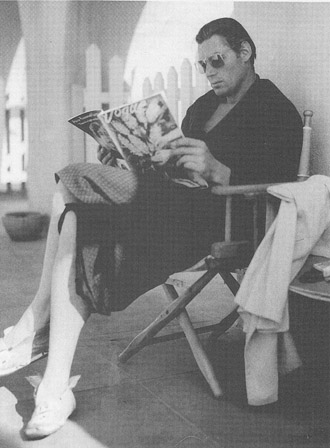
Vogue magazine had a most unlikely reader, the super macho Austrian athlete and screen Tarzan, Johnny Weissmuller, depicted above, reading the magazine.
[Johnny Weissmuller lived until 1984. His last screen appearance was in Won Ton Ton, the Dog Who Saved Hollywood (1976).]
***
In Los Angeles, Stewart Stern picked up his phone at about two o’clock in the morning. Jimmy was on the other end of the line, calling from New York, where he’d stashed himself away, without permission, from Rebel, its director, and its scheduling.
Stern warned him that if he didn’t fly back to Los Angeles at once, Warner was going to replace him with another actor. “You’ll be suspended. Without pay. Your career will be ruined.”
“I want to come back, but I’m frightened,” Jimmy said. He sounded drugged. “I don’t think I can play Jim Stark—and I don’t trust Nicholas Ray as a director.
Stern entreated him to return. “Jimmy, we’re ready to begin shooting. I’ve tried to fashion all my rewrites around Jim Stark, based on you. You can do it. You haven’t seen the final script. It’s Jimmy Dean! God damn it, you can play yourself, can’t you?”
Two days later, at around midnight, Jimmy showed up on Ray’s doorstep at the Château Marmont. “He just walked in,” the director said, “and had absolutely no excuse for his running away. He wanted to spend the weekend in bed with me, making love until I forgave him. The kid got his wish.”
At last, after almost a decade of delays, Rebel Without a Cause was set to go before the cameras. All sorts of problems had already been resolved, including censorship by Warners, casting problems, even Jimmy’s mysterious disappearance.
Ray wanted a very dramatic opening, and both he and Jimmy worked together to create something unusual, even stunning, to launch their movie.
As the title and opening credits of Rebel Without a Cause are flashed across the screen, a drunken Jim Stark lies on the sidewalk intoxicated, whimsically playing with a toy monkey. The scene might not have worked, but Jimmy made it memorable. The toy monkey was his idea.
Within a week of shooting in black and white, Jack Warner halted the production after reading the acclaim that Jimmy’s performance had generated for East of Eden. “We’ve got a star on our hands,” he told Ray. “There’s big box office here. We’re going to shoot the damn picture in color.”
Consequently, costume designer Moss Mabry scrambled to redesign Jimmy’s wardrobe, replacing Jim Stark’s original black leather jacket with a red nylon windbreaker. It became one of the most enduring costumes in film history, rivaled—among male stars, at least—by Charlie Chaplin’s bowler and Humphrey Bogart’s trenchcoat.
[Mabry dressed not only Jimmy and the other stars of Rebel, but would go on to design Elizabeth Taylor’s outfits in Giant, for which he received an Oscar nomination in 1956.]
During the filming of Rebel, Jimmy’s reputation from East of Eden grew rapidly, as did his fan base. Letters poured in from across America, including bags of mail from gay men. Many other handsome, well-built male stars, including Rock Hudson, also received gay fan letters, but none with the volume of what was sent to Jimmy.
As regards Jimmy’s friends, journalist George Scullin noted some changes: “He collected a group of sycophants who performed what gaucheries they could think of—party crashing, drunken binges, drug excesses, and offending for the sake of offending. What a pack of bastards!”
Early in Rebel, three troubled teenagers, as portrayed by Jimmy, Natalie, and Sal Mineo meet, at random and for unrelated transgressions at the local police station.
[In that scene, a drunken Jim Stark slams his fist into the side of a desk with a force greater than what the script had called for. When the scene was over, Jimmy was rushed to the hospital, since Ray feared he’d broken some bones. As it turned out, he was only badly bruised. “Too much Method acting,” Ray told him.]
Plato (Mineo), a mentally disturbed youth, had been hauled into the station for killing a litter of puppies for reasons he cannot explain. Judy was there for having violated some unexplained curfew.
Later, all three encounter each other again on the first day of school. As the camera focuses on Plato, an object of derision and ridicule by his peers, Mineo opens his locker to reveal a handsome publicity photo of his movie idol, Alan Ladd. Based on this cinematic clue, whereas gays across America immediately recognized Plato as one of their own, straight audiences of that day hardly took notice of the signal being (discreetly) projected.
In Manhattan, years later, Jay Garon, a notoriously well-known literary and film rights agent, proposed that Mineo write a memoir, for which Mineo would receive an advance of $40,000. Garon designated his client, Darwin Porter, co-author of this book, as its ghost writer.
According to Mineo, as relayed to Porter, “Late one night, after Rebel was released, I got a call from Alan Ladd.” Mineo said. “He sounded drunk.
“Thanks, kid,” he said, “for using my picture as your dreamboat in that locker scene in Rebel. I need all the publicity I can get.”
“They wanted me to use Burt Lancaster, but I went for you,” Mineo said. “My all-time favorite.”
“As a reward, I’d like any fantasy you might have to come true tonight. I’m home alone if you care to drop in.”
“Did you accept the invitation?” Porter asked.
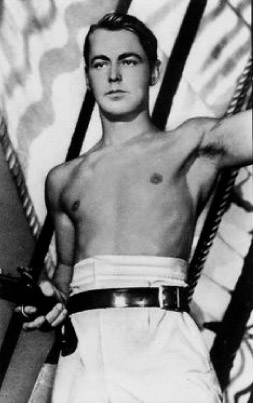
Alan Ladd...Plato’s “dreamboat.”
“What do you think?” Mineo replied. “I’ll tell you this much. Alan was not short all over.”
[Since the early 1940s, Hollywood insiders knew that Alan Ladd led a secret bisexual lifestyle.]
Mineo’s autobiography collapsed when he refused to out himself as a homosexual. Without that revelation, no publisher wanted a “vanilla view” of his life.
“I just couldn’t break all those female hearts, who sent me all those adoring letters in the 1950s,” Mineo said. “The money would sure have been nice, though.”
***
“The repressive censorship of films, originating in the 1930s, was on life support when Rebel Without a Cause was made,” Ray said. “But it would have been an even more powerful film if the original script had been used.”
He was referring to the underlying homosexual context of the dynamic between Plato and Jim Stark. “Homosexuality was still the love that dared no speak its name on the screen. And Judy was supposed to be a teenaged trollop. But we gave in to the demands of the censor, much to my regret.”
“Jimmy wanted to do other, more daring scenes that were not in the script. In one episode, he wanted to be shown lying in bed on his belly, with his naked ass showing. Of course, in a few years to come, such a scene would be considered typical, but not in 1955. European films had already broken through most of these taboos, but Hollywood was slow to catch on.”
“I watched Jimmy and Sal fall in love right on camera,” Ray recalled. “Jimmy even issued a director’s cue to Sal, telling him, ‘Pretend you want to run your fingers through my hair, but you’re too shy. Make believe you want to throw yourself in my arms and kiss me passionately. I want Nick to film us kissing and see what the blue noses say about that. They’re all mother fuckers anyway. Art should not be censored. Neither should love. It’s all right for films to depict men brutally killing each other. But to love a man? That’s out!”
So spoke James Dean.
Rebel, in addition to same-sex attraction, contained very oblique references to yet another theme of forbidden love too—incest.
Stern’s script called for William Hopper and Natalie’s characters to suggest an undercurrent of incest. An early version had called for her to sit on his lap, as she’d done for years in her capacity as his adolescent daughter. Without getting embarrassingly graphic, Stern had hoped to portray Hopper becoming sexually aroused, with the understanding that when he ultimately rejected her, it would be as a punishment for his own sexual feelings toward her.
In a pivotal scene that made the final cut, when Judy repeatedly tries to kiss her father, Hopper, with barely concealed fury, rebuffs her, saying “You’re getting too old for that kind of stuff, kiddo.” In reaction, she kisses him anyway, receiving a vicious slap in response. As her mother passively (and naïvely) observes this dynamic, Judy, sobbing, storms out of the house.
***
Based on the rave reviews being generated for East of Eden, Jimmy felt entitled to direct the other actors. Consequently, he instructed Dennis Hopper, “Don’t act like you’re smoking a cigarette. Smoke it! When you know there’s something more that should go into a character, and you’re not sure what it is, you just have to go after it! Walk on a tightrope!”
Jim Backus, in his own words, was Jimmy’s “henpecked father in an apron, mentally flabby and shillyshally.”
“He was a self-deprecating weakling of a man whose wife had long ago cut off his balls,” he claimed.
“I wish my character had been rewritten. I felt that, like my Mr. Magoo, Mr. Stark was also a cartoon character, not three-dimensional at all. I struggled to do the best I could, but the fault was with the script.”
“Actually, I never knew it would become such a legendary picture,” Backus said. “We started out to make a sort of Ozzie and Harriet sitcom with venom until Dean suddenly became an overnight sensation on our hands.”
***
Rebel’s soon-to-be-famous knife fight (Jim Stark vs. Buzz) was shot at the Griffith Planetarium, high in the hills above the Hollywood Bowl. With Jimmy and Corey Allen, Ray attempted to film the scene eight times, but none of them looked realistic. Finally, the two young actors got it right, although at one point, Allen’s switchblade slashed the skin of Jimmy’s throat. Although it was a surface wound, the cut drew blood.
Genuinely alarmed, and in his capacity as the film’s director, Ray yelled “cut” and frantically summoned the on-site nurse.
Bleeding from the throat, Jimmy denounced Ray for halting the action. “Just when we were getting real, you fucked it up, you bastard!”
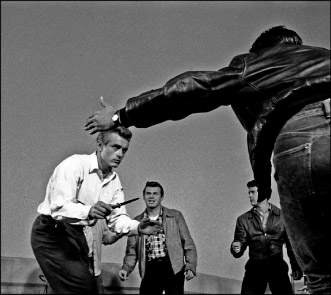
When Method acting gets out of hand: the knife fight in Rebel.
The cast had rarely, if ever, heard an actor address his director like that.
The nurse bandaged Jimmy, and he didn’t need to go to the hospital. After that, Ray instructed Rod Amate, a young stuntman, to double for Jimmy during the scene’s final moments, with the understanding that his face would not be visible.
Amate would also double for Jimmy in his souped-up ’46 Ford for the “chickie run” scene.
Days before the knife fight scene, Jimmy and Allen had each been carefully coached and rehearsed by “Mushy” Callahan, a former welterweight boxing champion, and a former street fighter.
***
Rebel’s most hair-raising scene involved the infamous “chickie run.” As a means of flaunting their nerves of steel (or their “yellow bellies,” depending on the outcome) Buzz confronts and challenges Jim Stark to a deadly and motorized game of “chicken.” Each of them agrees to race (stolen) cars to the edge of a cliff. The “coward” will be defined as the one who loses his nerve and jumps out first.
Allen was one of the longest-lived members of Rebel’s cast, surviving many of film’s other actors by decades, until his death in 2010. It took him years to be able to discuss the events that transpired between Jimmy and himself.
“He was practically directing the picture himself,” Allen said in his last interview. “Late one afternoon, he asked me if I’d ride off with him for the weekend. I didn’t want to, so I turned him down. He almost begged me to change my mind, and I finally gave in to him. I didn’t want to antagonize him. He invited me to this rental home he had, which looked like a hunting lodge.”
“I’d heard stories that he was gay, so I suspected what was coming. I was straight, and I felt that all I had to do was let him blow me. But after some weed and a few drinks, he made his request very explicit: ‘I want you to ride me like you’re Brando’s son,’ Jimmy said. ‘Really fuck the hell out of me.’ Believe it or not, I actually enjoyed it. Very tight. Great sex, I stayed all weekend, and he did things to me like no gal ever did. I don’t want to get specific, but there are some things a whore might do, but in most cases, not a girlfriend.”
“Before the end of the weekend, he told me what he really wanted from me as an actor during the final moments of the chickie run. He wanted me to convey that under different circumstances, instead of enemies, we might have been lovers. I understood that, and I tried my best to convey that on the night we shot the scene.”
“The character I played turned to him and said, ‘You know something? I like you.’”
“Why do we do this?” Jim Stark asks.
Allen, as Buzz, answers, “We gotta do something, don’t we?”
“It was a tender moment between the two men, one of whom will careen in his car off the cliff, crashing to a fiery death onto the rocky beach below. “I get my jacket caught, and can’t escape from my car in time. Those were my final words to Jim Stark. My character has only moments to live.”
When Jimmy jumps from his car before it plunges over the cliff, he was supposed to land on a mattress, with the understanding that as a prop and safety device, it would not be shown on camera. He ordered the prop man to take it away. “Okay, kid,” the man said. “It’s okay with me if you want to bust your nuts. But it’s the same mattress Errol Flynn used to land on out of camera range in one of his swashbuckling movies. It came from Warner’s prop department.”
“I said to move the god damn thing!” Jimmy ordered.
Allen later said, “That scene became iconic. It was a classic, the underlying question of each generation. ‘Here we are. What do we do?’”
After Buzz disappeared over the cliff and burst into flames on the beach, Judy (almost unbelievably and perhaps opportunistically) shifts the focus of her love away from the deceased gang leader and onto Jim Stark.
Another classic scene occurred after the death of Buzz, when Jimmy returns home to confront his parents, as played by Doran and Backus. He wants to go to the police and tell them the whole story.
Years after Jimmy’s death Doran, with a sense of admiration for his raw, intuitive talent as an actor, noted how Jimmy prepared for one of his scenes: “He’d drop to the floor in a fetal position for the longest time, chin and knees together, but still on his feet. He’d get as close to the floor as he could without lying on it. Finally came this weak little whistle from him, and he stood up, ready to do the scene, which he’d do in a single take.”
A big scene between Backus and Jimmy, with his mother looking on, occurs at the foot of a staircase. “A boy—a kid—was killed tonight!” Jim cries. He wants to report the incident to the police, but Mrs. Stark aggressively opposes that. “A foolish decision like that could wreck your whole life!”
In response, Jimmy pleads with his father: “Dad, stand up for me!”
At that point, Jimmy broke from the script and devised the action on his own. Backus wasn’t prepared for what happened next: Jimmy leaped at him like a wild animal released from its cage. He grabbed the beefy actor by his lapels and dragged him down the stairs and across the living room. The violence continued at a whirlwind pace as he threw Backus onto a chair, which fell over backward. Jimmy than wrapped his hands around Backus’ throat in a choke hold.
“He choked me until I thought I was a goner,” Backus said.
Doran, as Mrs. Stark, screamed, “You’re killing him! Do you want to kill your own father?”
The screenplay’s author, Stern, said, “I didn’t mean for the scene to be that violent. In my script, I expressed my own feelings about my own father. I wanted him wiped out, but I also wanted him saved.”
As one critic wrote, “In that dramatic scene, James Dean channels a young generation’s frustration and emotional claustrophobia.”
***
Near the end of the film, a decaying mansion became the setting for the most evocative scene in the movie. It involved Jim Stark, Judy, and Plato in a kind of love triangle, with Jimmy as the object of the others’ affections. It laid the groundwork for the film’s tragic ending.
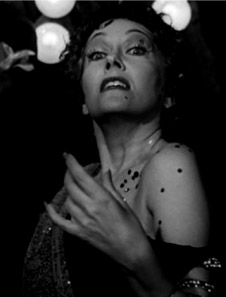
The “love triangle” in Rebel was filmed within the decaying mansion, just before its demolition, which had been the setting for many of the scenes within Sunset Blvd.
In the photo above, Gloria Swanson, playing the demented movie star, Norma Desmond, delivers her most memorable closeup.
It was Stern who came up with the idea of renting it. Located at the intersection of Wilshire and Crenshaw Boulevards, and owned by J. Paul Getty, one of the era’s richest oilmen, it was slated for demolition. Its cinematic fame had derived from its setting as the home of the demented movie queen, Norma Desmond, as portrayed by Gloria Swanson, in Sunset Blvd. (1950).
Desperately, Stern and Ray tried to contact the oil magnate so that they could film there. They finally reached him, and he agreed, charging them only $250 a day. “I bet that’s what he pays for a lobster cocktail,” Ray said.
Dating from the flapper age of the mid-1920s, the mansion, with its Mediterranean-style porticoes, pool, balustrades, and gardens, had been built by William O. Jenkins, the sugar magnate. Its swimming pool was especially famous, thanks to the fact that in Sunset Blvd., William Holden’s body had fallen into it after the abandoned egomaniac (Norma) fatally shot him.
It had been dubbed “The Phantom House,” because for many years, no one had lived there.
After Getty granted his approval for the building’s use as Ray’s film set, the director said, “I’m ready to film our Walpurgis Night.”
[In Germanic folklore, Walpurgisnacht, the night of April 30th (May Day’s eve), is when witches congregate on the Brocken mountain in north-central Germany, and conduct sexual revels with their gods in anticipation of the arrival of Spring.]
—Ann Doran
Celebrity psychic John Cohan was a friend and confidant of Hollywood stars for decades, including such luminaries as Elizabeth Taylor. In 2008, he shared some of those celebrity secrets in a memoir, Catch a Falling Star.
Cohan was privy to many of the behind-the-scenes dramas associated with the lives of Jimmy’s two co-stars, Natalie Wood and Sal Mineo. Cohan also became close to Nick Adams.
Adams would later reveal that he had “an insatiable lust” for Jimmy and, later, for Elvis Presley, who befriended him after Jimmy died.
Natalie said that when she came together again with Jimmy in 1955, after having made a teleplay with him the year before, “I was older and more grown up, and I knew a lot more about sex than I did when we first met.”
“I liked talking to him more than to anybody else I knew. My whole life seemed to change completely when he walked in. I was in incredible awe of him. I also thought he was the sexiest boy I’d ever met. Of course, I said the same thing about this guy named Robert Wagner.”
One afternoon, Jimmy told Natalie that in the real world, each of them lived a variation of the alienation that was represented by the characters they were playing, Jim Stark and Judy.
Columnist Hedda Hopper wrote: During the making of Rebel Without a Cause, Natalie Wood fell hard for James Dean.”
Even though he stole scenes from her, Natalie claimed that, “Working with Jimmy is pulsating, as he generates a theatrical electricity. Anyone playing with him can’t help but feel his tempo and drive. Even if he doesn’t have a line to speak, I feel he’s talking to me. I can tell by the way he looks, the movement of his hands, the slight motion of his facial muscles. I’ve never felt so excited with an actor as I do with him.”
“It’s great working with her,” Jimmy said. “Gone are the pigtails. No more bobbysox. She has pep, real vitality, and all the attributes of a powerful performer. I’m sure that in her future, she’ll play such roles as a whore.”
In reference to what happened over the course of the next few weeks, author Gore Vidal—who, like Ray, was living at the Château Marmont at the time—made several very clear assertions in his memoir, Palimpsest. “Nick Ray was openly having an affair with the adolescent Sal Mineo while the sallow James Dean skulked in and out, unrecognizable behind thick glasses that distorted myopic eyes. Ray would soon be embroiled in a different affair with a sixteen-year-old girl, Natalie Wood herself. He was forty-three at the time.”
Beverly Long said, “Dennis Hopper was terribly in love with Natalie, too, and he was heartbroken when he found out that she was also sleeping with Ray and Jimmy.”
Natalie told Cohan that it was Nick Adams who took her virginity at the suggestion of her mother.
She approached Adams when he came over one evening to pick up Natalie. Her mother told him, “I want you to teach Natalie the ways of the world. I’m afraid that if you don’t, she might be broken in by that queer guy, Jimmy Dean. That fellow is really weird. You’re not. I trust you with my daughter.”
Natalie showed Cohan her deformed wrist. “I have to wear bracelets to cover it on camera.” She shared her fears and anxieties with him. “After I moved on from child roles, I didn’t know who in hell I was or what they wanted from me. I’m talking about agents, producers, directors, and other actors.”
In Rebel, Jimmy gave Natalie her first screen kiss. “We did a lot of practicing off screen so we’d be camera ready,” she said, giggling.
“I played my first love scene with Jimmy,” Natalie said. “He seemed like a great nonconformist, a great rebel, but really, he was only eccentric.”
She also said that Jack Simmons was always trying to find out if Jimmy were having sex with her.
She was still curious to know if Simmons was also having sex with Jimmy. He told her, “I won’t say no, and I won’t say yes. I love and worship Jimmy.”
During filming, Natalie developed this powerful crush on Jimmy, and was always ready to accept his invitation to his dressing room any time he wanted to seduce her.
“He was so inspiring,” she said to Cohan. “Always patient and kind. He didn’t act like a movie star at all.”
“After our lovemaking, he gave me advice as an actress, very good suggestions. He was very critical of his own work, and never satisfied with a performance he’d just given. He worried about how every scene would turn out. He also had the ability to make his co-stars look great, too.”
She also told Cohan that during the making of Rebel, she was resentful that she and Mineo had to be supervised by a welfare worker because both of them were underage, and as such, their working hours, based on California State law, were limited. They were also given lessons by a tutor. “I was trying to play a grown-up, and I was embarrassed to be treated like a child. So was Sal.”
***
Sal Mineo was also a friend and client of Cohan, who said, “During the filming of Rebel Without a Cause, the young Bronx-born actor had a hot and heavy affair with Jimmy. In one scene, Ray had the two young men kissing, but, in the uptight 1950s, when homosexuality could not even be mentioned on the screen, that segment was cut by the censors. ‘The world wasn’t ready to see two young men kissing,’ Mineo said.”
Mineo told Cohan, “Natalie was real competition for me. I was madly in love with Jimmy and so was she. Before she was cast in Rebel, she told me that she must have seen East of Eden fifty times. Even if she were exaggerating, she’d seen it a hell of a lot.”
[Ray confronted Natalie years after Jimmy died. “You’re telling the magazines and even friends that you and Jimmy did not have sex. Is that true?”
“Come on, Nick,” she said. “I can tell the innocents that, but not you. You know I’ve spent many nights with Jimmy. What did you think we did? Hold hands? Frankly, I much prefer Robert Wagner’s cock to Jimmy’s, but we did go at it more times than I can remember. Sometimes, Jimmy liked to hurt his partner, and be hurt, and I don’t go in for that.”]
“Both Natalie and I adored Jimmy,” Mineo claimed. “If he didn’t give me a warm embrace when we met on the set in the morning, I was a wreck for the day. Actually, I wanted to kiss him any time I was around him, but there were always people about. I waited for him to call me into the privacy of his dressing room. That guy was some swell kisser, among other attributes.”
Jimmy’s friend, John Gilmore, paid a visit to the set. Between takes, the two actors amused themselves by naming the producers and directors who had put the make on them.
During Gilmore’s visit to the set, he became aware that Jimmy was having an affair with Mineo. “I knew something was going on. We headed for lunch in the commissary, and Mineo was walking ahead of us. Jimmy stepped up and pinched the right cheek of his ass. Mineo jumped. He was startled. But when he realized it was Jimmy, his big brown eyes lit up. His face flushed red, and he giggled, beaming in awe at his top.”
Another friend of Jimmy’s, William Bast, learned graphic details about Jimmy’s affair with Mineo. “Sal may be just a kid, but he’s got nine inches of Italian sausage that no butcher has ever tampered with,” Jimmy claimed.
“The nights Jimmy could spare for me were the most delightful of my life,” Mineo confessed. “I had never been penetrated before he did the job. Up to then, only oral sex. It hurt at first, but he made me take it, and I came to love it. He told me I had to endure the initial pain to prove my love for him. I did, and soon that pain turned into the greatest sexual thrill of my life.”
Mineo also told Cohan that before filming began on the flirtatious scene in the mansion with Jimmy and Natalie, Ray had coached him on how to play the scene. “Both Natalie and I were instructed to look at Jimmy like we were in love with him. That wasn’t hard to do. Both of us were already in love with Jimmy, especially yours truly. We played the scene like he was ‘Lucky Pierre,’ and we couldn’t wait to discover his erotic zones.”
Mineo talked to Cohan about what it was like working with Jimmy. “Rehearsing with him kept us on our toes. Without warning, he’d throw in different lines and improvise scenes. Frankly, I didn’t know at first what all the fuss about Jimmy was about, until I went to the first screening. He was great. He was sitting just behind me in the theater, and at least half a dozen times, I turned to look back at him. He was giving that grin of his and almost blushing, looking down at the floor between his legs.”
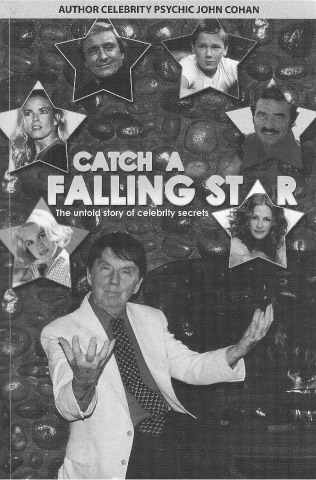
John Cohan, survivor of decades in the entertainment industry, is a psychic and confidant to celebrities, as depicted on the cover of his 2008 memoir.
Mineo confessed that off screen, as lovers, Jimmy experimented with S&M, and that, on occasion, urged lovers to crush out their cigarette butts on his ass. He wanted to keep his chest and back free from burn marks in the event that he had to strip before the camera. “Jimmy wanted some kinky stuff, but I told him to get it elsewhere,” Mineo said. “I wasn’t into doing stuff like that. I just liked regular gay sex.”
In the wake of Jimmy’s fatal crash, a coroner examined his body, inch by inch, making a note of the “constellation of kerotoid scars” he discovered.
Mineo described a bizarre and heretofore unreported event that happened to Jimmy and himself during the making of Rebel: Before the beginning of filming, Jimmy had hung out with a street gang from the south side of Los Angeles, hoping to absorb enough atmosphere to convincingly portray Jim Stark.
At one point, Mineo and Jimmy were abducted and taken to an abandoned warehouse in South Los Angeles. One biker accused Jimmy of not only giving him crabs, but a venereal disease too.
“We were saved by a miracle,” Mineo said. “Jimmy was allowed to call this doctor friend who agreed to cure the biker of both afflictions. Of course, getting rid of crabs was a lot easier than VD.”
Jimmy also made a $5,000 payment to the bikers. Mineo believed that, “If he hadn’t done that, I expect that both of us might have gotten a switchblade embedded in our guts.”
[Nightly in that part of L.A., bikers and members of their gangs were routinely murdered, especially during their turf wars.]
As related by Mineo to Cohan, one night, Jimmy invited him to his rented home, the one that evoked a hunting lodge, and came up with a surprising idea. According to Mineo, “He wanted me to save a sample of my sperm, frozen in a capsule for the later impregnation of the right woman. The plan was, that when Jimmy found the right carrier, he would pay for her to have my baby, which he would later adopt. Back in the 50s, this was a radical idea.”
“Jimmy also told me that he’d had his own sperm stored away for future use,” Porter said. He wouldn’t tell me where the sperm was stored, but it was at some clinic.”
[Shortly before Mineo was murdered in 1976, he told Cohan that “I’m the father of a child somewhere, but I don’t know where he is today.”]
Jimmy’s on-again, off-again affair with Mineo would continue after both of them were cast in Giant. “Instead of Natalie and Nick Adams, I had to compete with Elizabeth Taylor and Rock Hudson, at least in the beginning. Elizabeth continued to adore Jimmy until the end of his short life, but by the end of filming, Rock hated him and turned to me for sexual relief.”
“Mineo denied that he and Jimmy were lovers, at least at first,” Ray said. “Why not? It would have ruined his career. But his comments were hogwash. I’d seen them make love in my suite. They were great at it.”
***
As the years went by, Mineo became more open about his sexuality. During one of his last interviews, he told The New York Times, “I was in incredible awe of James Dean. I was fascinated by him. I think it was sexual to some extent, but I had no understanding of affection between men. I really gave him hero worship, and I recognized later what it was, but the feeling then was that I couldn’t wait just to get near him. It was only years later that I understood I was incredibly in love with him.”
Mineo recalled his death scene toward the end of Rebel, when he is shot by a policeman after he ran out of the Planetarium with a gun. It was not loaded. Jim Stark had removed the bullets.
“I wanted to do the scene over and over because he was grieving over losing me, and I was thrilled to be loved like that by someone. If you watch the scene, you realize he seemed genuinely moved, and I felt loved. After that, he was very protective of me. For the rest of the time, he didn’t want me out of his sight. He was always there for me. Alas, it didn’t last.”
As Mineo related to Cohan, “Both Natalie and I had the hots for Jimmy, both on and off the screen. But, according to the Production Code, for my sin, I had to get bumped off in the end. In those days, if a ‘queer’ was depicted in a novel, or whatever, he has to die at the end. I was fatally shot by the cops. Faggots aren’t supposed to go on living, much less loving.”
***
Dennis Hopper, on the set of Giant, bragged to Jimmy about the conquests he had made, even at a young age. “I don’t think there’s a starlet walking that I can’t screw,” he boasted. “Actually, I prefer to give head to a beautiful woman rather than fuck her.”
In time, Dennis would have A-list conquests such as Ursula Andress, Jimmy’s former girlfriend, and Joan Collins. But when Jimmy met him, he was involved in an affair with Natalie.
He later confided to Jimmy, “A day after I met Natalie—Ray introduced us—the little bitch phoned and asked if I’d go out with her. She told me I was very good looking, and that she wanted me to fuck her. I found out that Nick Adams had broken her in. Back in Kansas, women weren’t this aggressive. The following night, we drove up to Mulholland Drive and made love. I think she wanted to get into her character of Judy, who in the first script, was sexually promiscuous.”
“I got into terrible problems with Ray,” Dennis said, “because we were both fucking Natalie. Her parents were starting to figure that out. Nick snitched on me to them. I was furious at the bastard.”
Perhaps to get back at Dennis for his pursuit of Natalie, Ray decided to set him up with his neighbor at the Château Marmont, author Gore Vidal. As a means of engineering the hookup, Ray lied to Dennis, telling him that Vidal was writing the script for a major motion picture that might contain an Oscarwinning lead role for him.
“Hopper went for it,” Vidal later told Tennessee Williams and others.
“He arrived all innocent and wide-eyed, dewey eyed, really,” Vidal said. “For dinner, he drove me to his favorite pizza joint in his new red Austin convertible he purchased with money he’d made in the movies.”
“When I got him home, he objected to getting fucked, but he endured it anyway,” Vidal said. “I told him to think of God, country, and the lead role in the hottest new movie property coming up. He endured it, but then wanted me to blow him. I told him I’d owe him one.”
“There was no movie contract,” Vidal said. “The kid had to learn that you don’t trust people like Gore Vidal or Nicholas Ray.”
***
Despite his sexual involvements with a number of men—namely Simmons, Ray, Dennis Hopper, and Mineo—Jimmy continued his dating of women. Once, he invited the Swedish starlet, Lilli Kardell, to the set of Rebel to watch a scene being shot.
Natalie seemed jealous of her, especially when Kardell informed her that Jimmy had escorted her to the bullfights in Tijuana the previous weekend. “Later, in our hotel, he stripped naked at the foot of the bed and told me to pretend that I was the bull. Then he got an erection and jumped on top of me, plunging his sword deep into the gut of the ‘bull.’”
***
Beverly Long, cast as Helen, one of Rebel’s “gang molls,” noted how “Nick Adams was always sucking up to Jimmy, desperately trying to be his best friend. They had been roomies.”
Adams had serious competition from Jack Simmons. He was ready to hop into Jimmy’s bed, or Natalie’s bed, whoever summoned him. Sometimes, it was Ray himself.
“I had the feeling that Jimmy knew that Adams was sucking up to him,” Long said.
At the time of filming, Adams was rooming with Dennis Hopper. Jimmy with a certain derision referred to them as “Big Dick and Little Dick.” [The chronically indiscreet shock jock, radio star Howard Stern, once asserted, on the air, that “Dennis Hopper’s got one the size of an elevator button.”]
One day at lunch, Adams was dining with Jimmy in the commissary. Jimmy looked up and saw that a publicity picture of himself had been on the wall where an equivalent likeness of Dennis Morgan had once hung.
“Morgan out, Dean in,” he told Adams. “I can’t stand publicity.” He jumped up, grabbed the photo from the wall, and smashed its protective glass by hurling it to the floor. Then he stormed out of the dining room.
Ironically, George Stevens, who later directed Jimmy in Giant, summoned Adams to a recording studio after Jimmy’s death. When Jimmy played Jett Rink, an old man in a drunken banquet scene, his voice had not recorded properly. Nick Adams was the best imitator.
“I stuffed my cheeks with chewing gum to produce Jimmy’s exact sound,” Adams later explained.
Natalie claimed that “Nick Adams wanted to be my lover, Jimmy’s lover, and Ray’s lover, but what he really wanted was to become Jimmy’s replacement, adored by millions. Alas, dreams often are only to be dreamed.”
***
One night in his apartment, Jimmy told Jack Simmons, “I really like Natalie, and I want to be friends with her, perhaps star in another movie with her. But I’m growing bored with her schoolgirl crush on me—in fact, I find it intolerable. I have this plan. It’s inspired by something really shitty that Marlon Brando did to Pier Angeli to break off their affair.”
Independently, and as confirmation of that, Natalie also discussed some of the shocking provocations that ended her romantic fantasies about Jimmy.
As they moved deeper into their relationship, he began to taunt and tease her. One day, when she was studying her lines from a script, he walked over to her, whipped out his penis, and urinated on her pages.
At first, she was forgiving, dismissing it with, “He’s just a Method actor trying to work himself up to play Jim Stark before the camera. That act was something that Stark, an alienated outsider, might do.”
His provocations of her continued: Almost daily, Jimmy began to chastise Natalie for being “too Hollywood,” accusing her of coveting the trappings of stardom and longing to become as famous as Marilyn Monroe.
As part of this ongoing campaign, Jimmy invited Natalie to visit his rented home—the one that resembled a Bavarian hunting lodge. “I’ll be upstairs on the balcony—just call up to me and come in. The door will be unlocked.”
That night, however, he wasn’t waiting for her on his balcony, but downstairs on the ground floor, entertaining Mineo. Shortly before her scheduled arrival, Jimmy stripped off his clothes and ordered Mineo to do the same. They were kissing and fondling each other when Natalie’s car drove up. Mineo was ready to reach for his clothes, but Jimmy held him down and forcibly penetrated him, imprisoning him.
From the driveway, Natalie called up to the (otherwise empty) balcony and, as instructed, opened the front door without knocking. She screamed in horror at the sight of her (naked) lover sodomizing Mineo. In tears, she fled from the scene.
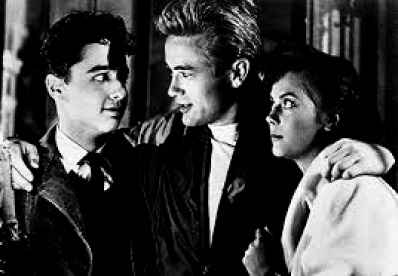
Love knows many faces in Rebel Without a Cause. Alienated from their own families, and although tragedy was about to strike, Sal Mineo (left), Jimmy, and Natalie Wood created an ersatz family all on their own.
The next day on the set, Jimmy approached her. “Stop your dreaming about me. I’ll never marry you.”
Holding back her tears, she ran toward her dressing room.
***
In years to come, usually during conversations with a girlfriend, Natalie would become very graphic during discussions of the various merits (or lack thereof) of her lovers and their respective endowments.
“Nick (Adams) had the biggest, Dennis (Hopper) had the smallest, and Jimmy was somewhere in between. Nick Ray was far more than average. When it came to kissing, Jimmy sure beat Elvis Presley. Nicky Hilton was a beer can. I don’t know why Elizabeth (Taylor) divorced him. Steve McQueen was a dud in bed, but he told friends I was lousy in bed, too. Frankly, he just didn’t inspire me. When it comes to giving out a prize the length of Oscar, the Academy should present a statuette to John Ireland. What a man! Oh, and Frank Sinatra should at least get a Supporting Player award.”
Natalie had this X-rated conversation with gossipy Shelley Winters, who had also seduced both Jimmy Dean and John Ireland.
***
Jimmy dreaded the end of shooting of Rebel Without a Cause. After his involvement in its filming ended, he lingered on the set for a conversation with Ray, telling him, “Never has an acting job taken so much out of me. I put everything I had into that film.”
“Jimmy and I were alone,” Ray said. “We wandered about and didn’t want to admit it, but it was all over. Finally, I said to him, “Let’s go. We’ve got nothing more to do here.”
“We kissed each other passionately. Then he climbed onto his motorcycle, and I got behind the wheel of my car. We rode toward Hollywood Boulevard. He spread himself like a flying angel on the cycle, with his feet up on the back mudguard, his arms outstretched. With that reckless maneuver, he sped off with a roar.”
Jimmy never lived to read his reviews.
***
Doran later said that about a week after the film was wrapped, she heard someone calling up to her bedroom window at three o’clock one morning: “Mom! Mom!”
She looked down to see that her porch light was dimly illuminating Jimmy standing in her front yard.
“It’s your son, Jimmy!” he called up to her after she raised the window.
“He was drunk,” she said. She let him in and poured some black coffee into him “as he spoke of his fears and talked about his dreadful loneliness.”
***
The last time Steffi Sidney saw Jimmy was when he came into the Villa Capri, right before his death.
Frank Sinatra had thrown a party there. A few months before, he had mocked Jimmy, but now he’d apparently accepted him as a member of the Hollywood elite. Jimmy staggered in, obviously drunk.
He stopped first at the table of his friend, Sammy Davis, Jr., before heading to the men’s toilet, trailing behind Sinatra.
When he emerged, his fly was open. “You could see his dick, as he wore no underwear,” Davis said. “He complained to me: ‘I stood at the urinal beside Sinatra. And now I’m jealous. His dick is bigger than mine.’”
“Then he made his way over to Sidney’s table, and put his arm around her. His hair had been shaved back from his forehead so he’d resemble a more accurate rendition of the aged character he’d portray at the end of Giant.”
“You know, Steff,” he said. “We’ve never had our picture taken together. Let’s go for it.” He summoned the on-site photographer, who snapped several pictures of them, shooting Jimmy, for the most part, from the waist up.
He placed one arm around her, holding a cigarette in one hand, and rubbing his belly with the other.
[The ironies associated with that photo was that eight-by-ten glossies of Jimmy with Steffi arrived at her house on the morning of September 30, 1955. Jimmy would be dead in the afternoon of that same day.]
***
It was on that September 30, 1955, in New York that Natalie Wood was dining with Sal Mineo, Nick Adams, and Dick Davalos, who had portrayed Jimmy’s tormented older brother in East of Eden. All of them talked about Jimmy, and how he flirted so dangerously with death. To a person, they agreed that he would probably die one day in a car crash.
Before the end of their dinner, news reached them that Jimmy had died in a car crash on a lonely road in California on his way to Salinas.
***
Rebel Without a Cause was released on October 3, 1955. Jimmy had died just a few days before, on September 30. For the most part, Jimmy’s performance elicited rave reviews.
Author Lawrence Frascella wrote: “Ray and Company offers up a romantic, charismatic, sexually charged archetype—a heroic ideal of what being a teenager might mean in Rebel Without a Cause. The film took teenagers as seriously as they took themselves.”
Writing for Esquire, Joy Williamson said: “Rebel’s appeal is obvious. We were watching the intense, doomed performance of a dead youth, a myth, the myth of those who would wish to see themselves dead without dying. Dean was dead, pre-dead, dead upon our discovery of him. His vivid presence projected a fathomless absence. It was thrilling.”
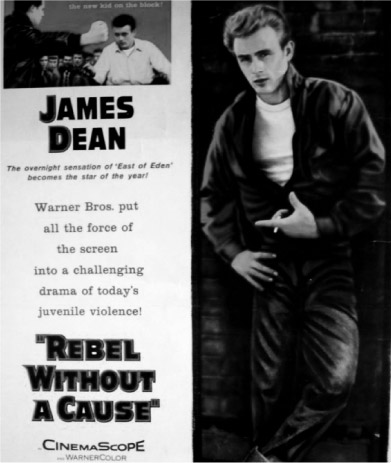
Film historian Jeanine Basinger wrote: “Rebel hits home because the teens in it understood their situation at a level the adults could not even imagine. The film is true emotionally, setting up the world of teenagers as a separate universe. It treated their pain seriously, respecting it, instead of turning it into the subject of a cute little comedy about growing up.”
Arthur Knight in Saturday Review said: “The late James Dean reveals completely the talent seen in his East of Eden performance. Gone are the Brando mannerisms, gone the obvious Kazan touch. He stands as a remarkable talent, and he was cut down, it would seem, by the very passions he exposed so tellingly in this strange and forceful picture.”
William K. Zinsser, in The New York Herald Tribune, said: “The movie is written and acted so ineptly, directed so sluggishly, that all names but one will be omitted. The exception is James Dean, the gifted young actor. His rare talent and appealing personality shine through, even in this turgid melodrama.”
Wanda Hale, of The New York Daily News, interpreted the picture like this: “As an honest, purposeful drama of juvenile hardness and violence, it doesn’t measure up. Nonetheless, Dean gives a fine, sensitive performance of the unhappy teenager, tormented by the knowledge of his emotional instability.”
Variety asserted, “As a farewell performance, James Dean leaves behind, with this film, genuine artistic regret, for here was a talent which might have touched the heights.”
Milton Schulman, in London’s Sunday Express, wrote: “Again, one is impressed by the effects of powerful emotions so harnessed and controlled that if it were not carefully rationed, it would explode.”
Bosley Crowther, in The New York Times, delivered his usual attack on Jimmy’s performances, leveling the familiar charge that he imitated Marlon Brando in his characterization of Jim Stark. “This imitation grows monotonous at some point,” he lamented.
Alan Brien, in London’s Evening Standard, wrote, “James Dean, alas, is dead. But his ghost on the screen in what was only his second film will remain among the immortals of cinema.”
Dilys Powell, in London’s Sunday Times, claimed, “There has been no player of his or any other generation to rival James Dean’s interpretation of the desperation of youth.”
The novelist, William Faulkner, weighed in, too: “Rebel Without a Cause will remain a masterpiece, because it is the only American cinema’s Greek tragedy.”
***
When the Academy Awards announced its Oscar nominations, it came as a surprise that Mineo was nominated as Best Supporting Actor and Natalie was nominated as Best Supporting Actress. Both of them lost to Jack Lemmon in Mister Rogers and to Jo Van Fleet in East of Eden.
Jimmy was not nominated, presumably because he’d already been nominated for East of Eden.
Elvis Presley was fascinated with James Dean and would endlessly watch Rebel Without a Cause. So when he got to Hollywood, he sought out and befriended Nick Adams, who had been Jimmy’s friend.
After only a few weeks, Nick became best friend to Elvis, launching a troubled relationship that witnesses claimed turned sexual. Nick himself loudly proclaimed that he’d had affairs both with Jimmy and later with Elvis.
Their bromance began when Elvis accepted an offer to be Nick’s “date” for a preview of the film The Last Wagon (1956).
Nick was known as a “star-fucker.” His closest friends said he’d go to bed with any star – male or female – who might advance his career. Rock Hudson. Director John Ford. Natalie Wood. James Dean. Elvis Presley. It didn’t matter to Nick as long as the fuckee was a star or even better, a director.
In the words of Albert Goldman, Nick was “forever selling himself: a property which, to hear him tell it, was nothing less than sensational—‘the greatest little actor to hit this town in years.’ In fact, he had very little going for him in terms of looks or talent or professional experience. He was just another poor kid from the sticks who had grown up dreaming of the silver screen.”
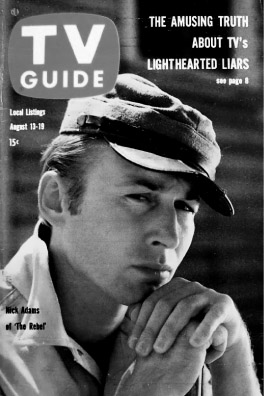
Nick Adams’ greatest success came when he was cast in a TV series about a Confederate soldier, Johnny Yuma, nicknamed The Rebel. Even though it became wildly popular, it was pulled after two seasons, based on studio politics.
The handsome, blonde-haired actor became the fourth member of the doomed young crew of Rebel Without a Cause who would die young and violently.
In death, he joined the actual stars: James Dean (died September 30, 1955), Sal Mineo (February 12, 1976), and Natalie Wood (November 29, 1981).
Born on July 10, 1931, in the gritty coal-mining town of Nanticoke, Pennsylvania, actor Nick (whose name at the time of his birth was Nicholas Aloysius Adamshock) was the son of Ukrainian immigrants.
A close bond between Elvis and Nick Adams was established on the first night they met. Nick told Natalie Wood, “Elvis is going to replace Jimmy in my life.”
Right from the beginning, Nick offered his services to Elvis: Friendship, a guide to “Inside Hollywood,” a bosom companion, a homosexual lover. “Whatever it is you want, I’ve got it … and plenty of it,” Nick told Elvis. “If you want to meet movie stars, I know them. Want to fuck Natalie Wood? I can set it up.” And so he did.
When Elvis arrived in Hollywood in 1956 to make Love Me Tender, the mega-star fell in love with his co-star, Debra Paget. She gave him his blue suede shoes and told him to keep on walking.
Elvis asked Nick to show him Hollywood, and Nick readily agreed. When Elvis and Nick met, “the chemistry exploded” between them and an instant friendship developed.
Within a week, as Nick later told another lover, Sal Mineo, Nick and Elvis were sleeping together. Elvis preferred oral sex and mutual masturbation. Penetration, apparently, was never an option between them.
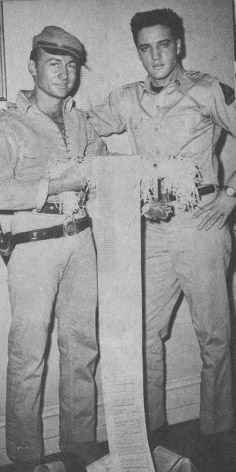
By the time Elvis Presley (right) got to Hollywood, James Dean was dead. The singer had wanted to bond with Jimmy and become his most intimate friend. He even wanted to play him on the screen. In lieu of Jimmy, Elvis “settled” for Nick Adams, based on the assumption that Nick—for a while, at least—had been Jimmy’s best friend.
In those days Elvis could drive his white Cadillac all over Los Angeles with Nick beside him. There was never any fear of molestation from fans. Fan magazines of that era were quick to pick up on this new friendship. However, they misinterpreted its real purpose and accused Nick of riding on Elvis’ coattails to promote his own career. (Previously, the same accusations had been leveled about Nick when he developed his friendship with Jimmy.)
Nick took Elvis to the same places he’d frequented with Jimmy, including the old Villa Capri when it was on McCadden Place. They were seen dining frequently at Googie’s Restaurant on Sunset Boulevard. Elvis wanted to know what foods Jimmy had liked, and he asked for the same dishes.
When Elvis had to return to Graceland, he left Nick an airplane ticket. To avoid suspicion, Nick flew to Tennessee two days later, telling friends that he was going to New York to seek work on the stage.
Sometimes at Graceland, Elvis would have a lover’s quarrel with Nick, and Nick would be forced to sleep in a room with Vester Presley, Elvis’s uncle.
A tabloid ran a story that Nick and Elvis shared the same bed at Graceland. When that news broke, Elvis—ever sensitive to charges of homosexuality—ordered that a cot be brought into his bedroom. He told friends that Nick slept on the cot and not in the same bed with him, which—according to the hired help—was not true. A maid later told the press that the covers on that cot were never turned down the mornings after Nick slept over with Elvis.
Late at night, Elvis and Nick would be seen together on the streets of Memphis, riding their twin Harley Davidson motorcycles.
Elvis’s girlfriend, June Juanico, claimed that when she dated Elvis all he ever did was talk about Nick Adams.
To legitimatize their relationship, Elvis hired Nick to accompany him on cross-country tours. Nick came out first to warm up the audience by doing his impressions of the famous actors he’d learned to mimic as a kid, notably Cagney and Bogart. Elvis warned Nick not to allow them to get trapped alone together by a photographer. Elvis always insisted that he be photographed with some pretty young girl in the picture, most often a fan. On several occasions that pretty little girl was Natalie herself.
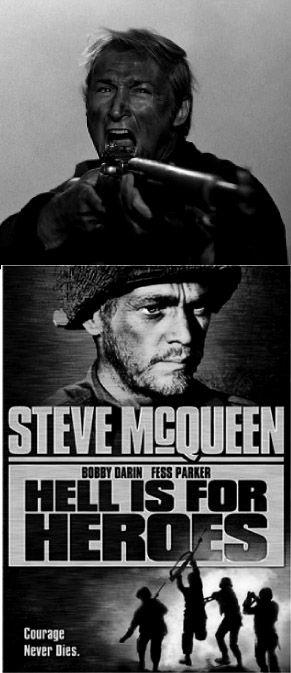
Years after Jimmy’s death, Nick Adams was still a working actor in Hollywood. He’s depicted in the upper photo as he appeared in Hell is for Heroes (1962).
In the hotel suites they co-inhabited during their tours, Elvis also insisted that Nick walk around in a pair of tight-fitting white jockey shorts, arranged so that his pubic hairs would peep out. He confessed to Nick that this was his ultimate turn-on.
“Elvis was into oral sex and enjoyed getting a blow-job more than intercourse,” Dennis Miller, a former friend and companion, confirmed. Nick later claimed that while Elvis was watching a sci-fi flick, Queen of Outer Space [a campy 1958 bomb co-starring Zsa Zsa Gabor] he was “getting head” from Nick.
Nick later revealed some of Elvis’s sexual secrets, claiming that the star was uncircumcised. Nick went on to assert that Elvis had told him that during sexual intercourse with a woman, or even masturbating, his tight foreskin would often tear, causing him to bleed.
Elvis constantly bragged to Nick about his conquests with women. But he claimed that he could not have sex with a woman who had borne a child. “Fucking a woman who’s given birth is like plowing your dick into a tub of fat,” Elvis said. “She’s too loose to provide any enjoyment for a man.”
In the months following Jimmy’s death, Nick learned that Robert Altman was going to film The James Dean Story. Elvis was excited and intrigued, eventually lobbying to portray his hero on film. “This would be my greatest achievement,” Elvis told Nick.
Elvis was bitterly disappointed when he learned that Altman had decided to configure the film as a documentary with still photographs, film clips, and narration by everyone from Natalie Wood to Clark Gable (of all people).
Nonetheless, Elvis persisted, insisting that he wanted to be the narrator, for which he agreed to appear free. Altman wanted Marlon Brando for the job, but he turned down the job, which eventually went to Martin Gabel instead. [The most sardonic moment in the documentary, released in 1957, occurred when the filmmakers inserted a commercial of Jimmy, with Gig Young, wherein he urged viewers to drive safely. As a promotional device, Warner Brothers hired Nick to travel to Marion, Indiana (James Dean’s birthplace) for the premier of the Altman film. On site, Nick visited Jimmy’s aunt and uncle, Marcus and Ortense Winslow.]
***
At Graceland, Elvis became obsessed that “I look like a faggot on film.” Night after night he sat with Nick watching his own movies. He asked Nick to warn him if he were “making any limp-wrist moves like one of those god-damn effeminate swishes.” To his male friends, Elvis, in spite of his own nocturnal adventures, often attacked “swishes” or “faggots,” never wanting to be identified with them in any way.
When Nick pointed out some scenes where Elvis raised his wrist limply, Elvis would go into a rage and denounce Nick. At one time Elvis got so angry that he ordered Nick from Graceland and tore up his return ticket home. But the next day he forgave his friend and welcomed him back.
Elvis’s manager, Colonel Tom Parker, handled the Elvis/Nick affair calmly. “At least he’s not impregnating another gal and leaving me to abort another brat.”
Col. Parker appreciated Nick’s support of Elvis after the death of his mother, Gladys Presley, on August 14, 1958. “Nicky Admas [sic] came out to be with Elvis last Week wich [sic] was so very kind of him to be there with his friend.”
During his period of mourning, Elvis locked himself in his darkened bedroom with Nick for three days and nights, refusing to eat or to see anyone else. Nick later claimed that Elvis talked for days about Gladys. Nick recorded all that he’d learned in journals which he’d been keeping ever since he arrived in Hollywood.
At one point he revealed Elvis’s darkest secret to both Natalie and to Rock Hudson, suggesting that he feared “Elvis’s relationship with Gladys was incestuous.”
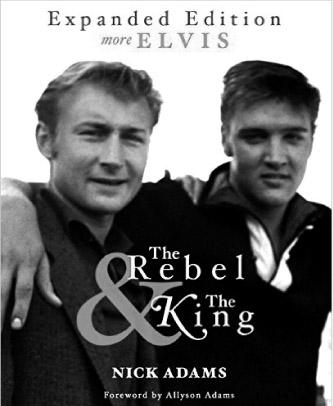
In 2012, Nick Adam’s daughter, Allyson Adams, published a posthumous overview of her father’ relationship with Elvis. Some readers interpreted it as a “whitewash.”
Susan King of The Los Angeles Times wrote, "The Rebel and the King chronicles Adams’ and Presley's adventures...with a youthful exuberance and innocence."
Afraid that news of Elvis’s homosexuality would leak out, the Colonel spread stories about what a stud Elvis was, even linking him to the stripper Tempest Storm, whom previously Elvis had seduced.
Elvis told his stepmother, Dee Presley, that he’d slept with more than 1,000 women before marrying Priscilla. Over the years he claimed to have had sex with everyone from the British sexpot Diana Dors to the American sexpot, Jayne Mansfield, even Cybill Shepherd, Nancy Sinatra, Connie Stevens, Tuesday Weld, Mary Ann Mobley, and Ann-Margret, among countless others.
With all his commissions, ancillary deals, and trinket sales, Col. Parker was actually making more money—an outrageous 50% split—than Elvis himself.
In the words of biographer David Bret, Col. Parker had a “Svengali-like grip over Elvis because he continually threatened to reveal that Elvis had romanced Nick Adams.”
Every time Elvis would get fed up with the colonel’s larceny and try to fire him, Parker would threaten to blackmail him. Only after Elvis’s death did revelations about his bisexuality appear in print, notably in Dee Presley’s memoir, The Intimate Life and Death of Elvis Presley.
Nick’s luck turned when a producer, Andrew J. Fenady, created a character for Nick to play in a TV series. It was Johnny Yuma, a young ex-Confederate soldier who helps restore law and order as he roamed the West after the Civil War. The series became known as The Rebel, and premiered on October 4, 1959.
It didn’t occur overnight, but eventually, Nick Adams became a household word throughout America. No more did columnists refer to him as “The Leech,” and even today, many viewers from the Age of Sputnik can remember the catchy jingle that opened each episode of the series. But in spite of its success, ABC canceled the series after two seasons. Nick was bitterly disappointed. He’d spent all his money.
Somewhere along the way, Nick’s straight side asserted itself. On May 10, 1959 he married Carol Nugent, a former child actress. They would have two children—Allyson Lee, born February 23, 1960, and a son, Jeb Stuart, born April 10, 1961.
Ultimately Nick had a devastating effect on Elvis. He was the man who introduced Elvis to drugs, supplying him with his first bennies.
On the verge of bankruptcy, Nick flew to Graceland for a meeting with Elvis. Their passion for each other had long ago cooled.
Nick arrived drunk for his showdown with Elvis. Alone in Elvis’s bedroom, Nick demanded that the star give him a check for $100,000 for all the services rendered over the years.
Elvis was drugged. He accused Nick of being “The Leech,” applying the exact same words used by tabloid columnists during the late 50s and 60s. Elvis refused to give him any money, even his return fare to Los Angeles.
At that point, Nick made a fatal mistake. He threatened Elvis, claiming that he was going to write a tell-all memoir. Throughout the course of his star-fucking career, he’d kept extensive journals, even describing the pornographic details of sexual bouts with both male and female stars. Nick used to tell friends, “I take the advice of Mae West. Keep a diary while you’re young, because it will keep you when you get old.”
The exact details of Nick’s final confrontation with Elvis aren’t known, but when Elvis steadfastly refused to “give you one buck, you bastard,” Nick delivered his final, perhaps fatal, threat. He warned Elvis that he was not only going to write about their affair, but tell all the secrets he’d learned about Elvis and Gladys during the three days and nights he’d spent with Elvis in the wake of his mother’s death.
Col. Parker “threw a fit” when he heard that Nick was writing about his affair with Elvis. “He’s joining those tabloid vultures,” the colonel told his confidants. “This is only speculation, but I’m not sure that boy has much longer to live.”
***
Nick Adams found peace at last on February 6, 1968. His dead body was discovered by his lawyer, Ervin Roeder, at his house in Coldwater Canyon. It was propped in a sitting position against the bedroom wall. An autopsy revealed that he had overdosed on a cocktail of the anti-anxiety medications Paraldehyde and Promazine. A coroner’s report determined that the death was “accidental, suicidal and undetermined.” But persistent reports of foul play continue to this day. There was no suicide note.
Roeder called the police at once. When they arrived fifteen minutes later, Nick’s body was removed on a stretcher and placed in an ambulance. As this was being done, the house was searched. There were no signs of a robbery, and the police even noted some loose cash and two valuable rings on a nearby nightstand.
When Roeder searched through Nick’s desk, he reported that the manuscript of the exposé which Nick had been working on was nowhere to be found. Even more significant were Nick’s journals, which were also missing. He’d kept them for years. Nick’s tape recordings were also missing, even his typewriter, a cherished gift from James Dean.
An autopsy performed that night by the L.A. County Coroner revealed that Nick’s body contained a massive dose of the sedative paraldehyde. The drug had acted in lethal concert with the tranquilizer Promazine. But no paraldehyde container was found in the house. A chemical cousin of formaldehyde, paraldehyde had been prescribed by Nick’s brother, a doctor, Andrew Adams.
Dr. Thomas Noguchi, “coroner to the stars,” finally concluded on March 3, 1968, that, “The mode of death is certified as accidental suicide and undetermined.” What was not said was that at first Nick’s death had been ruled a homicide.
The case would become fodder for a legend. The tabloids went wild, speculating that Nick’s so-called suicide was actually murder.
One of his closest friends was the Oscarwinning actor Broderick Crawford. “Nick was very outspoken to me in the weeks before his death,” Crawford said. “He told me about the memoir he was writing about Elvis and James Dean. I warned him that if Col. Parker found out about it, ‘You’re dead meat, kid.’ But no one could tell Nick anything. Until my dying grave, I’ll believe that Parker ordered Nick killed.”
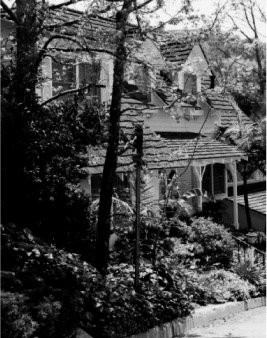
Adams’ house on El Roble Lane in Los Angeles, where police found him dead. The unsavory circumstances of his death were never clearly explained.
A fellow actor, Forrest Tucker, agreed with him. “In the weeks before his death, Nick told me that he feared bodily harm from Parker. He also told me that he kept two guns in the house just in case of a break-in. When the police searched the house, no weapons of any kind were found. Whoever broke in to steal the incriminating journals and manuscript even took his Johnny Reb cap. Nick always told me he wanted to be buried in that cap one day. I just hope that hip gyrator, Elvis, had nothing to do with this.”
“Absolutely, it wasn’t suicide,” Robert Conrad, Nick’s closest friend, was quoted as saying. “We were so close that if he’d intended that, I’d have known about it. Murder? I don’t know. It could be foul play.”
Jeb Adams, Nick’s son, claimed in 1992 that he was “99.99% sure” that his dad had been murdered.
His revelations about James Dean and Elvis Presley have, as of this date, never been published. The whereabouts of his manuscript are not known. Perhaps it was destroyed.
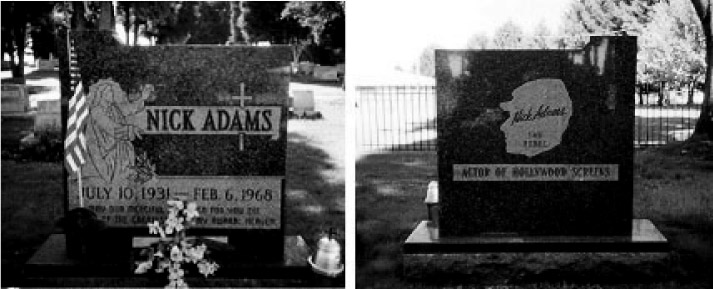
Only a few graying fans, mostly homosexual men, still visit the grave site of Nick Adams. He was buried near his birthplace in Berwick, Pennsylvania. The restless son of immigrant parents from the Ukraine, he always maintained a burning ambition to become a movie star, “The New James Dean.”
After a brief success, his career began to slip into oblivion. Faced with mounting bills, he played the dangerous card of blackmail. That move probably cost him his life.